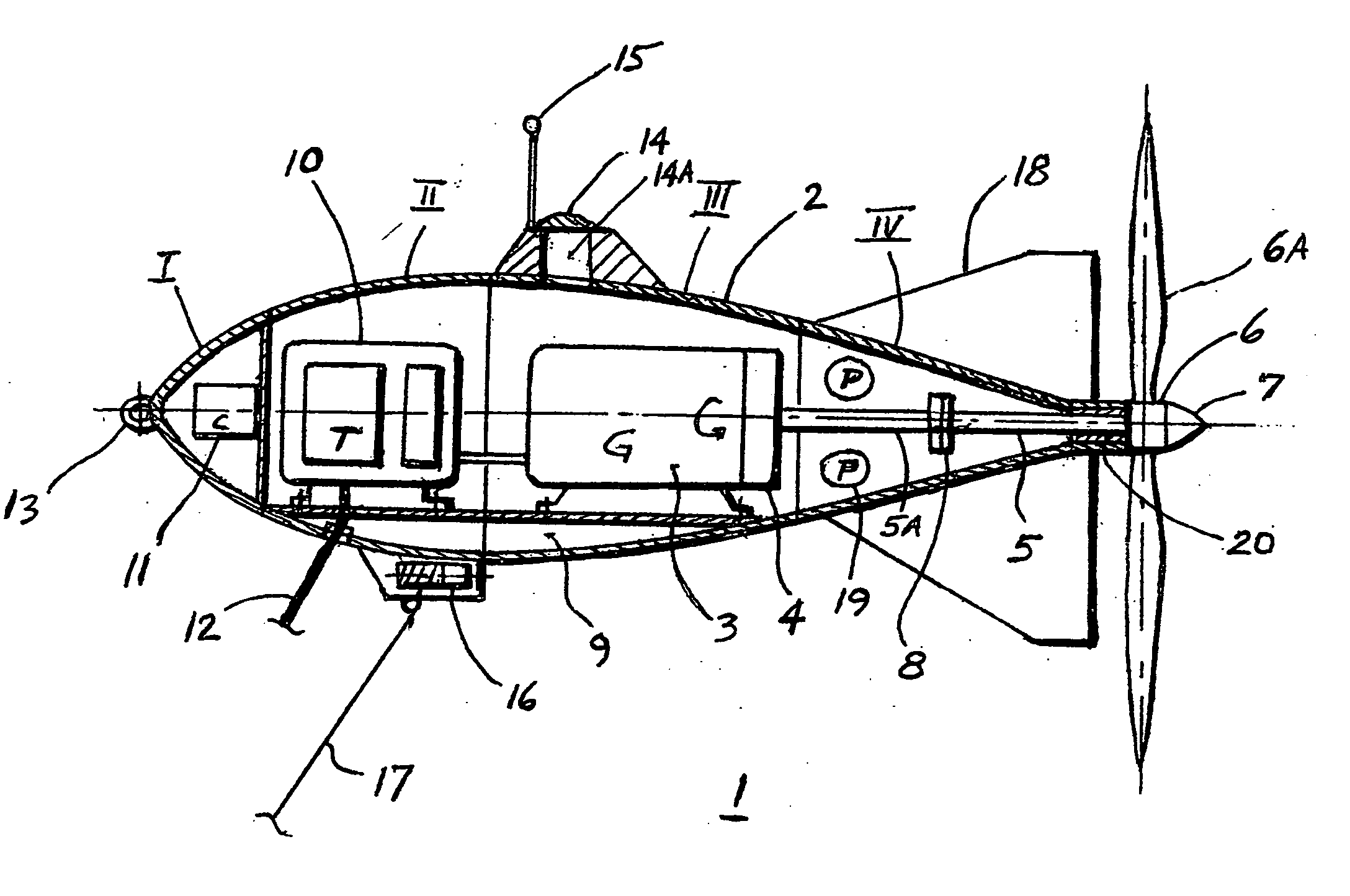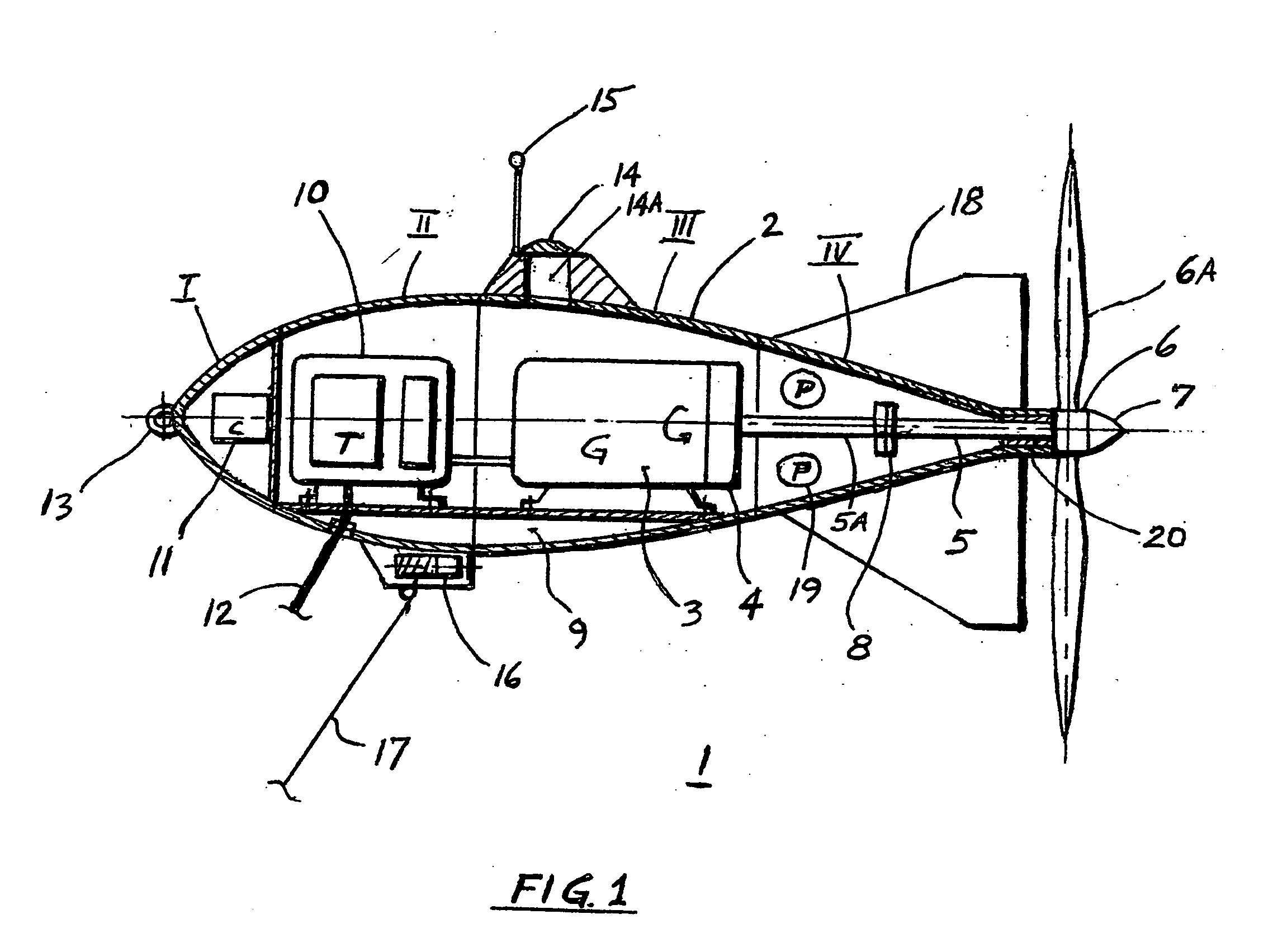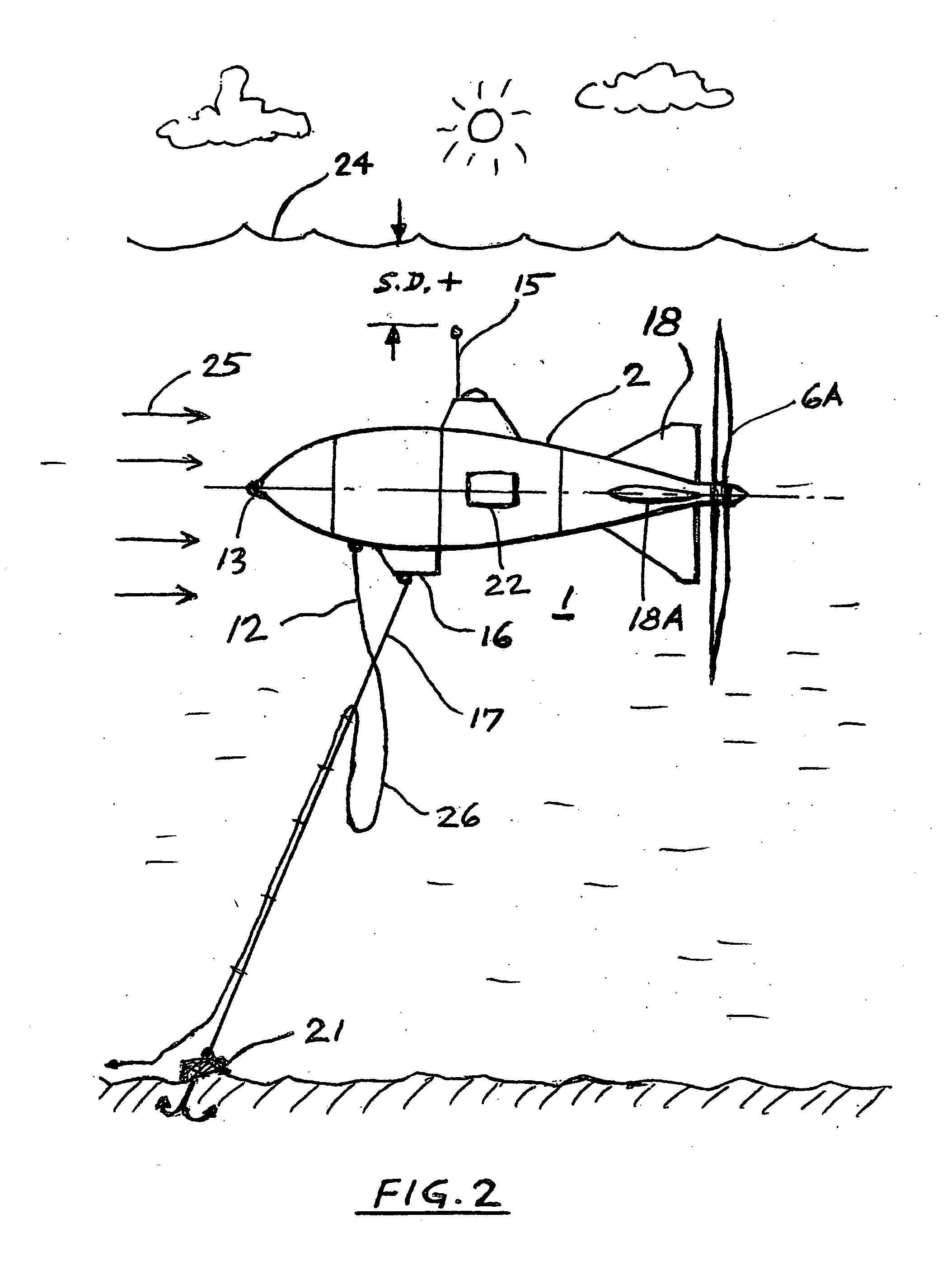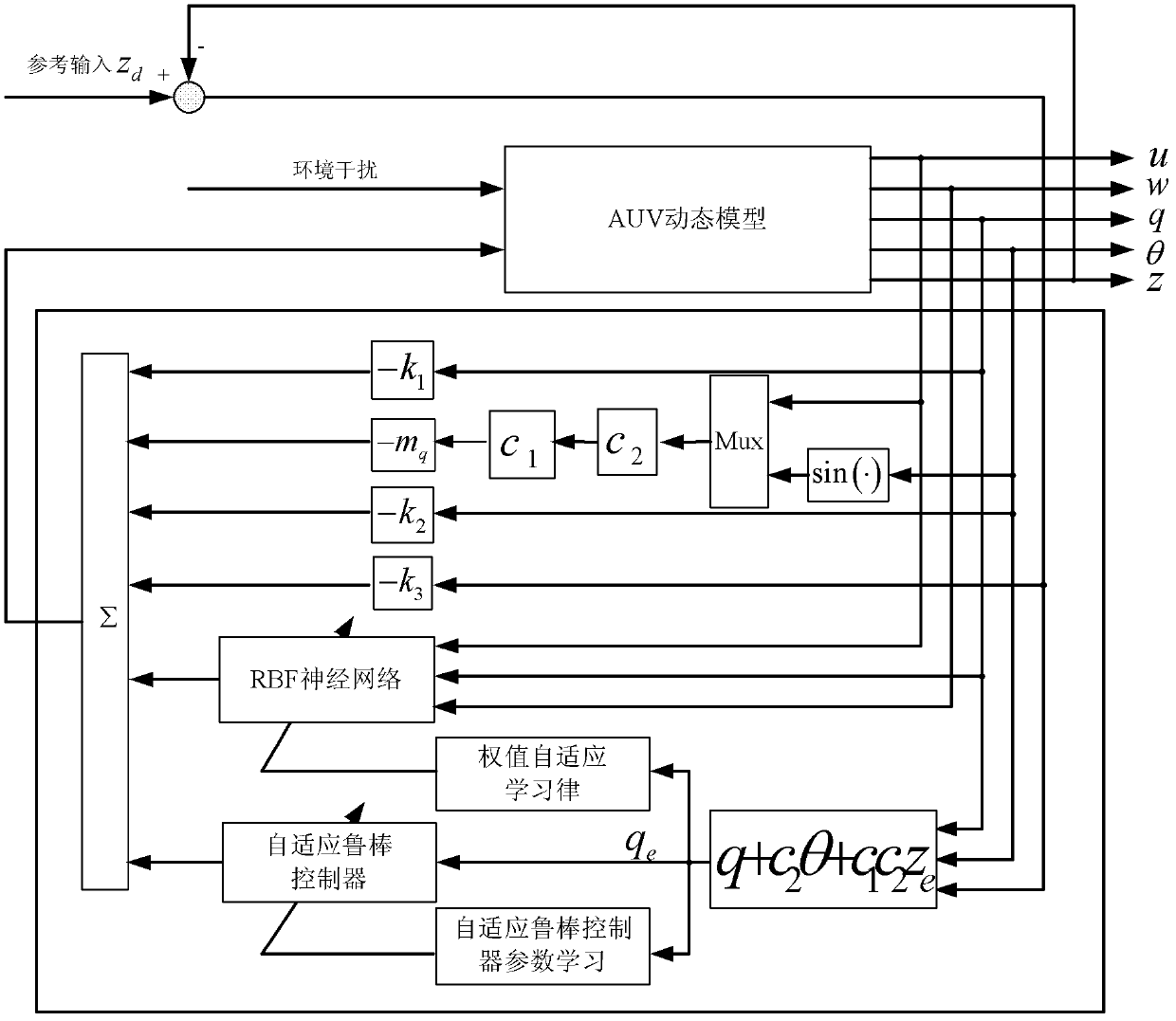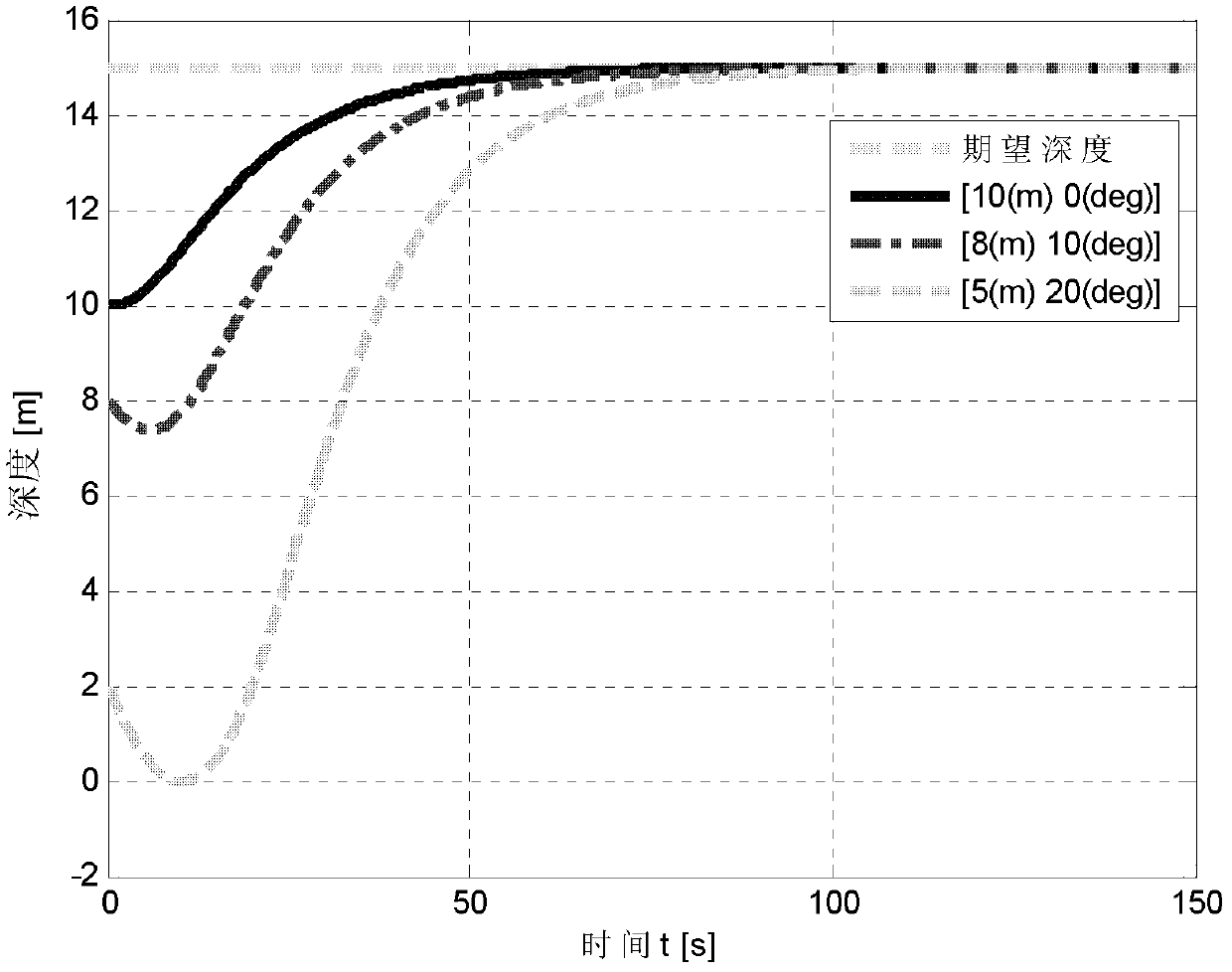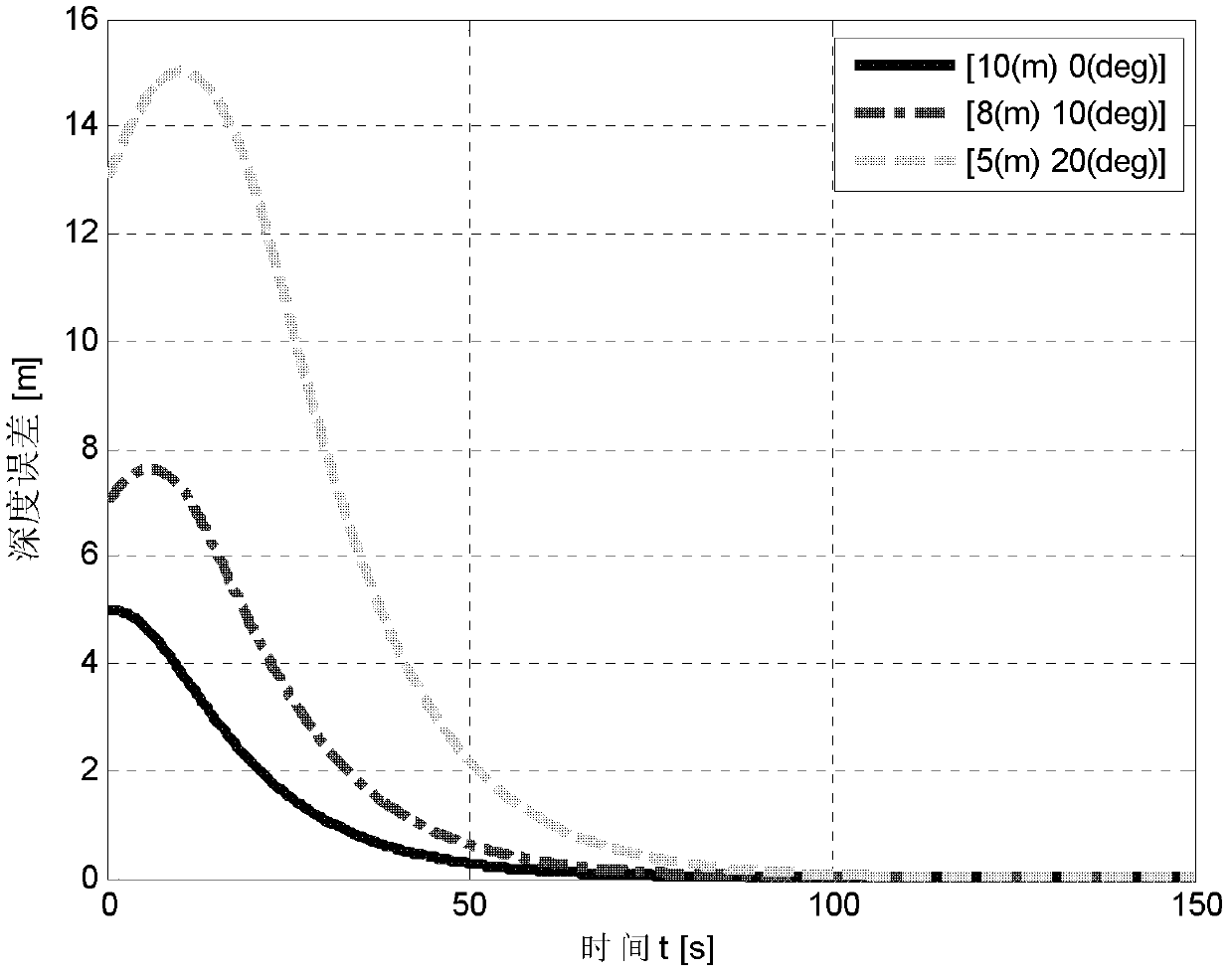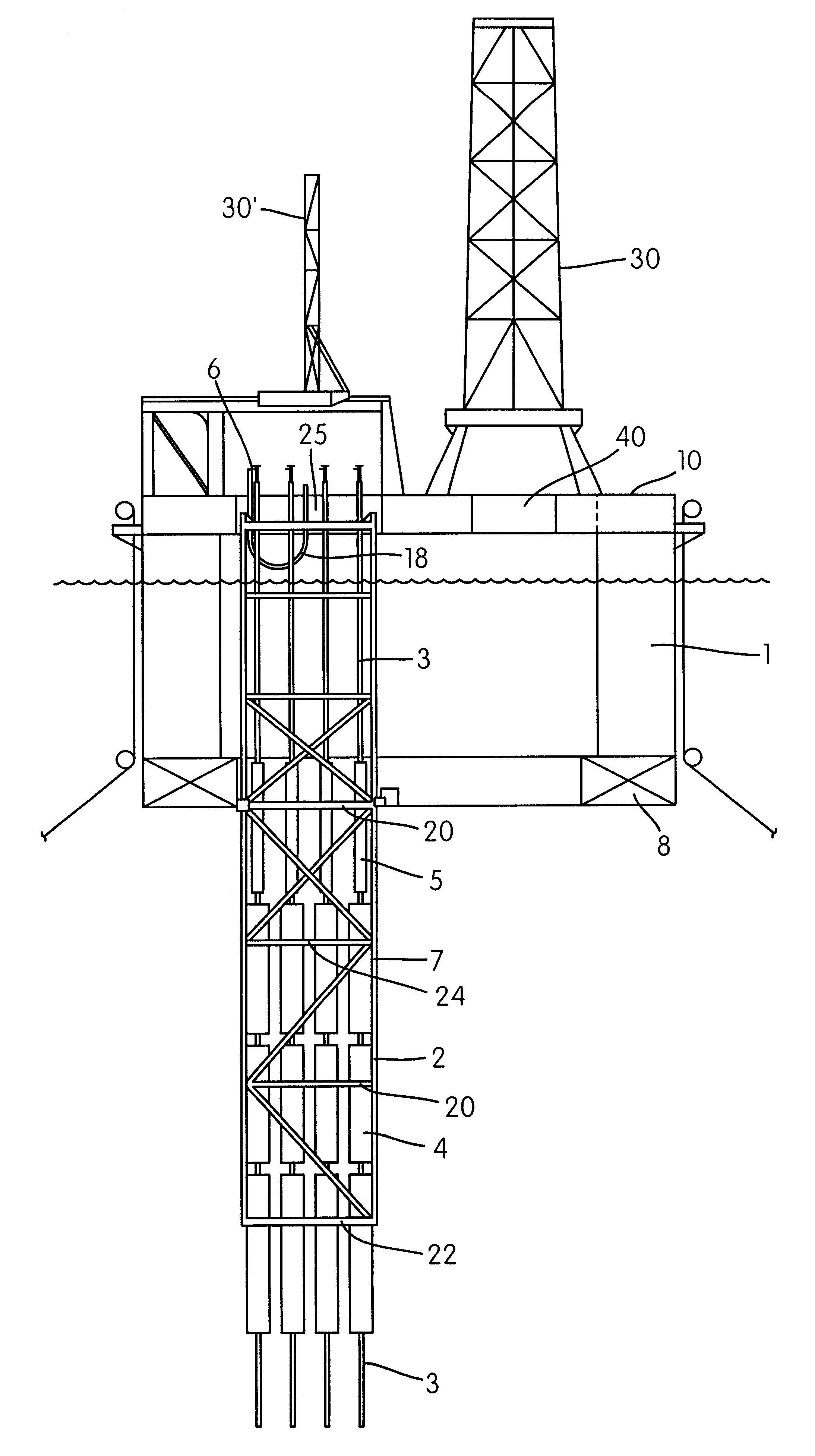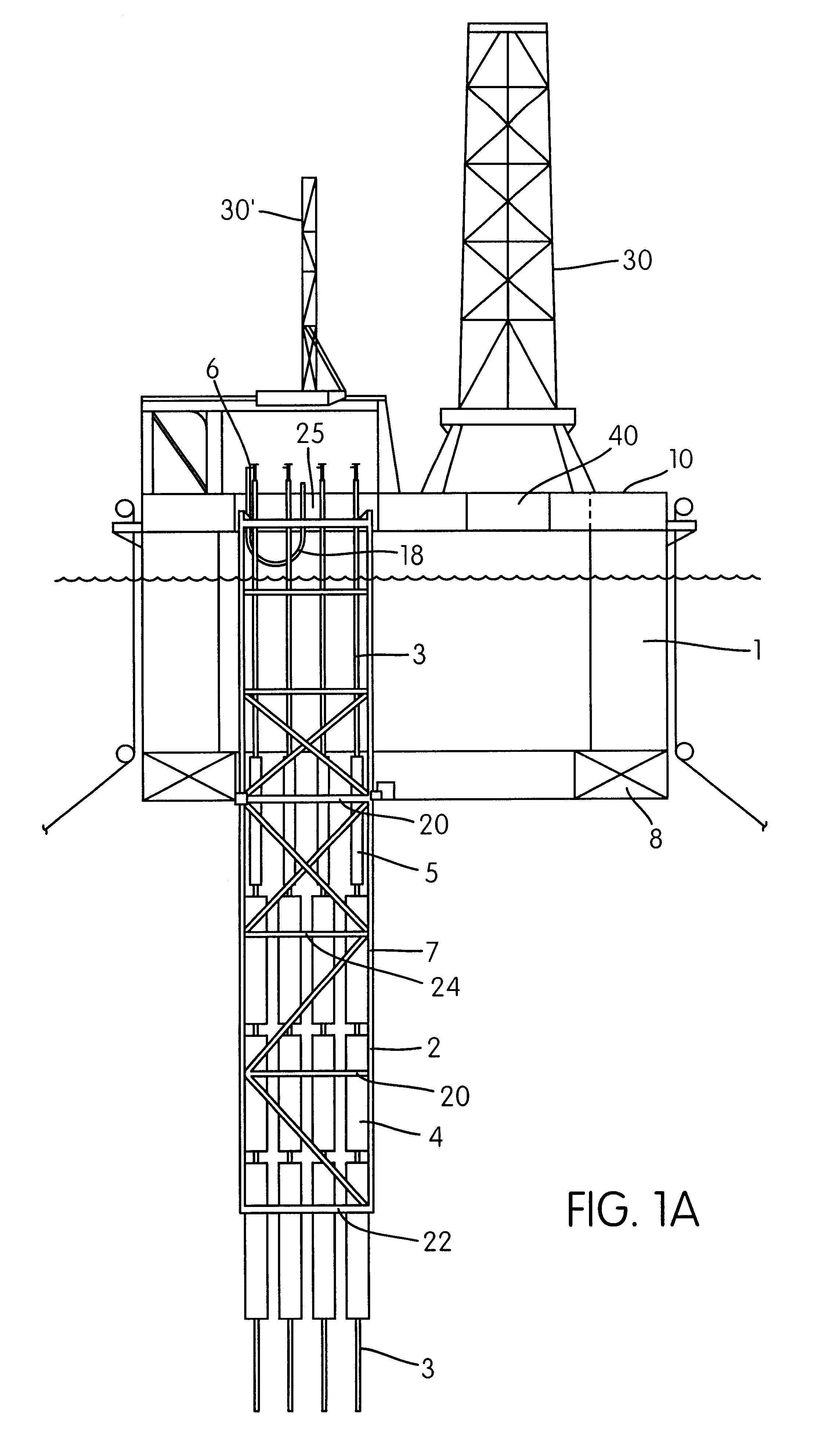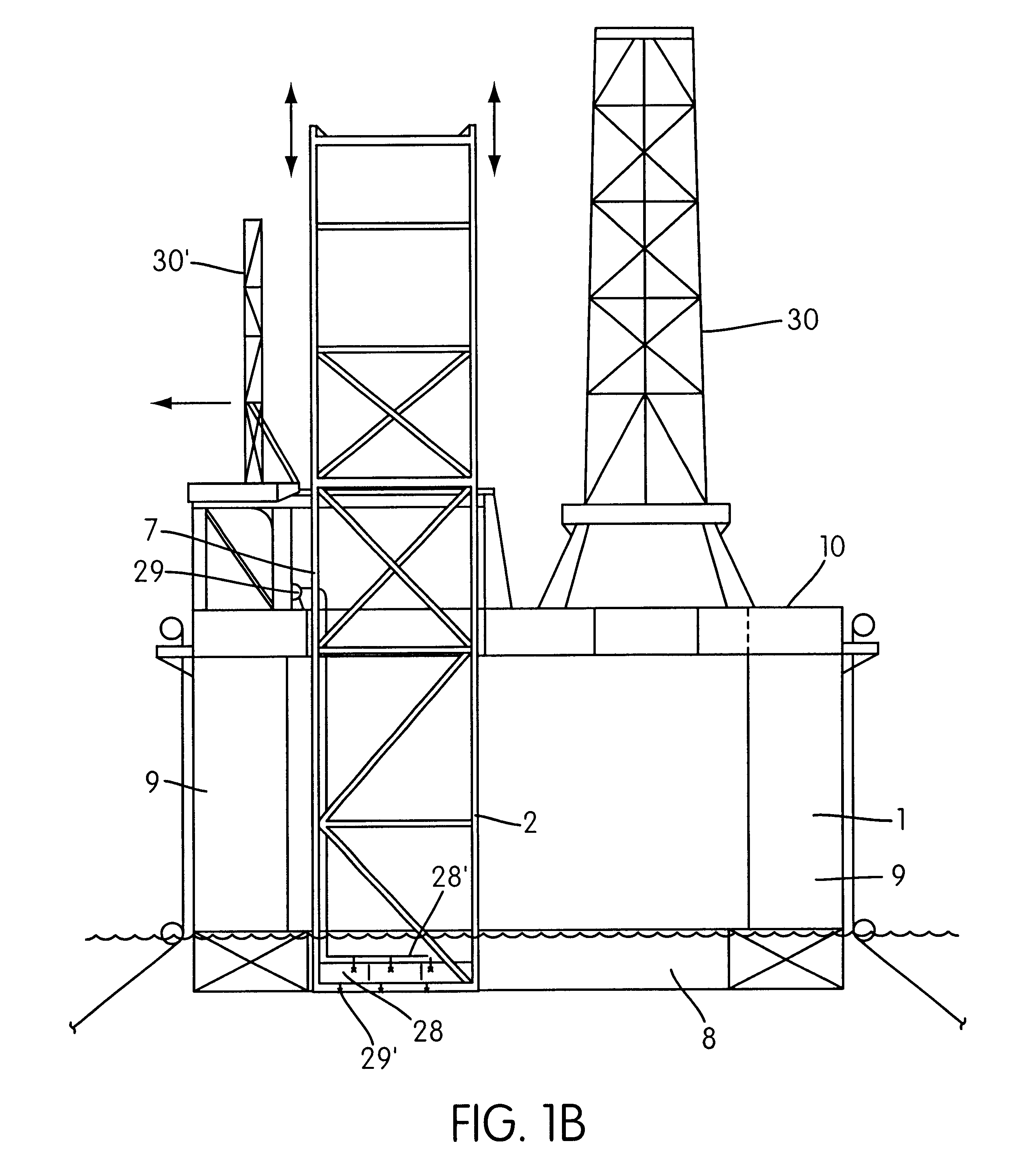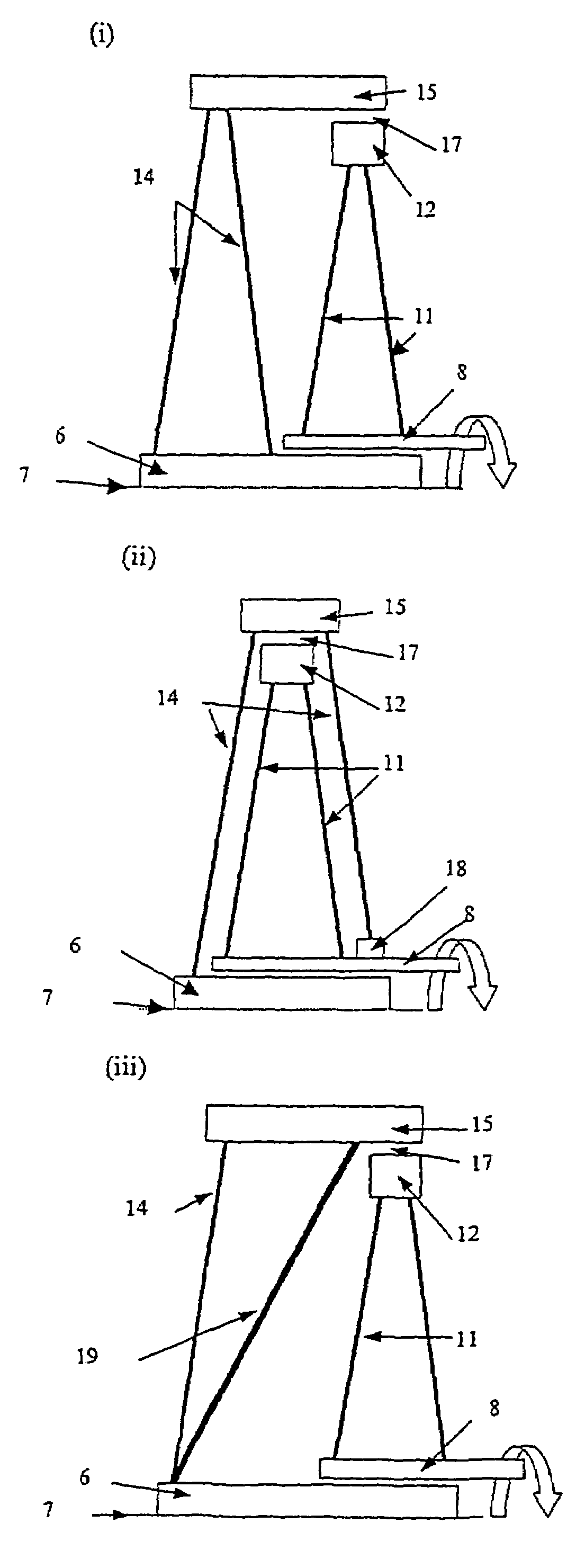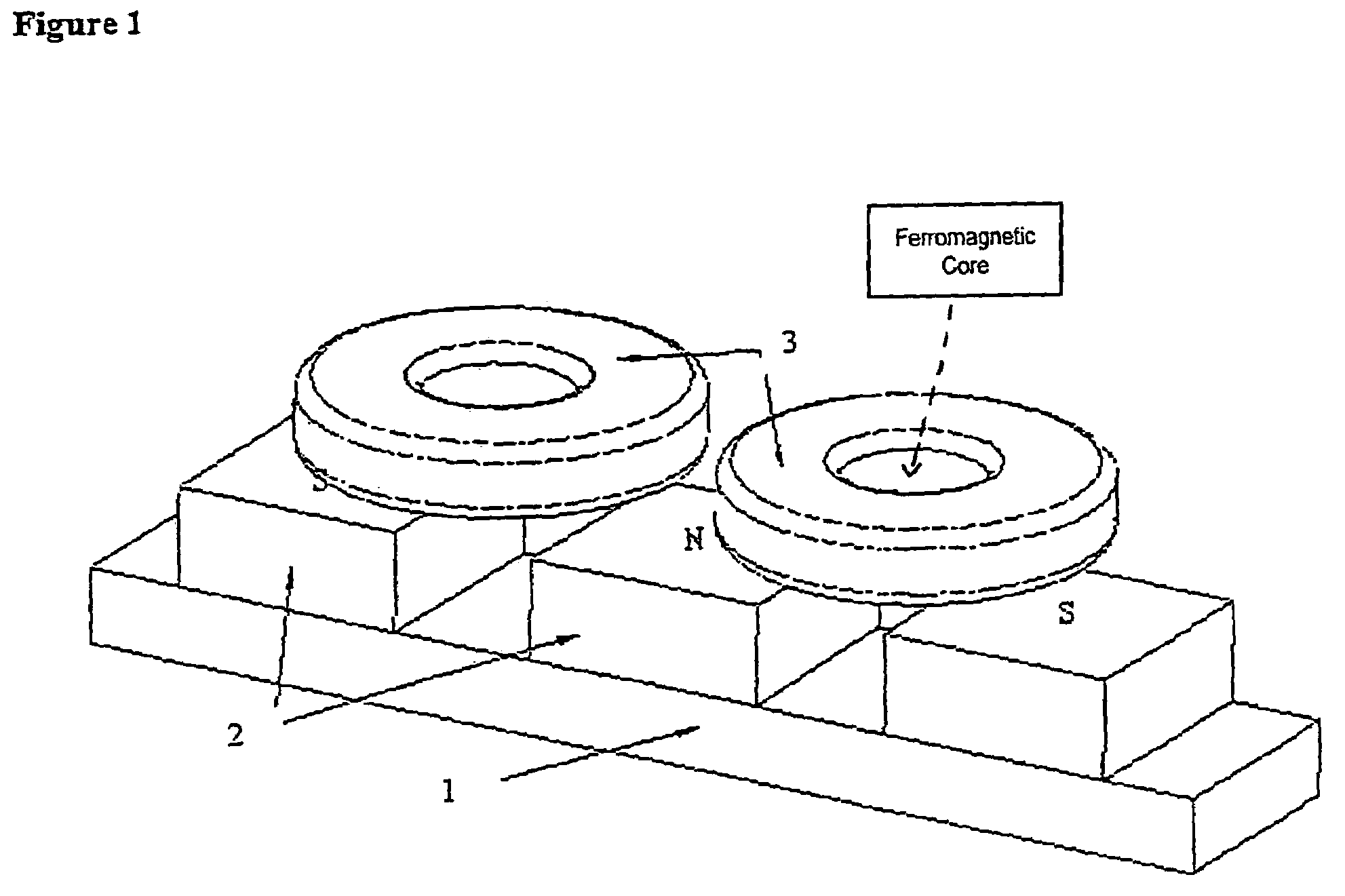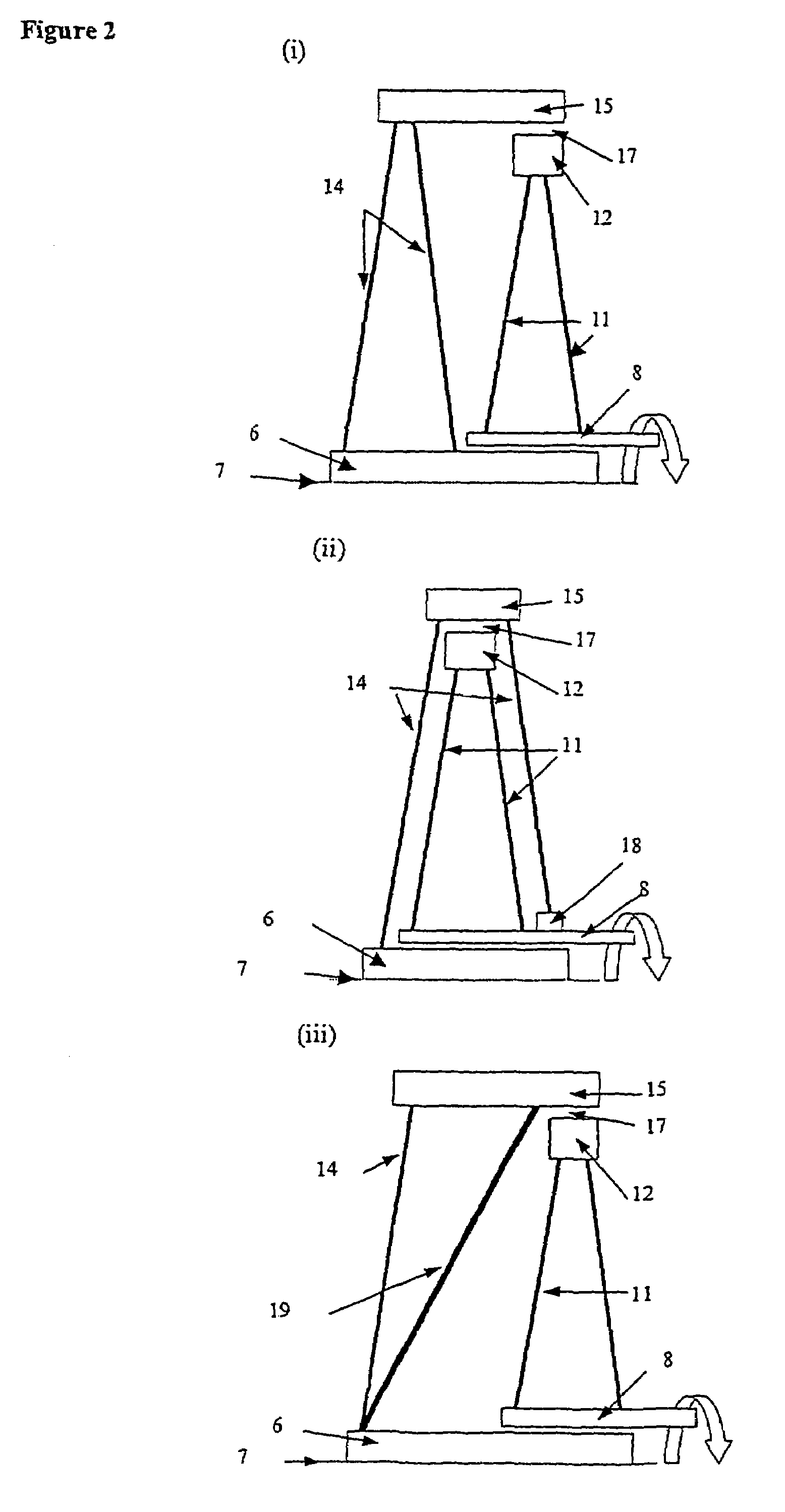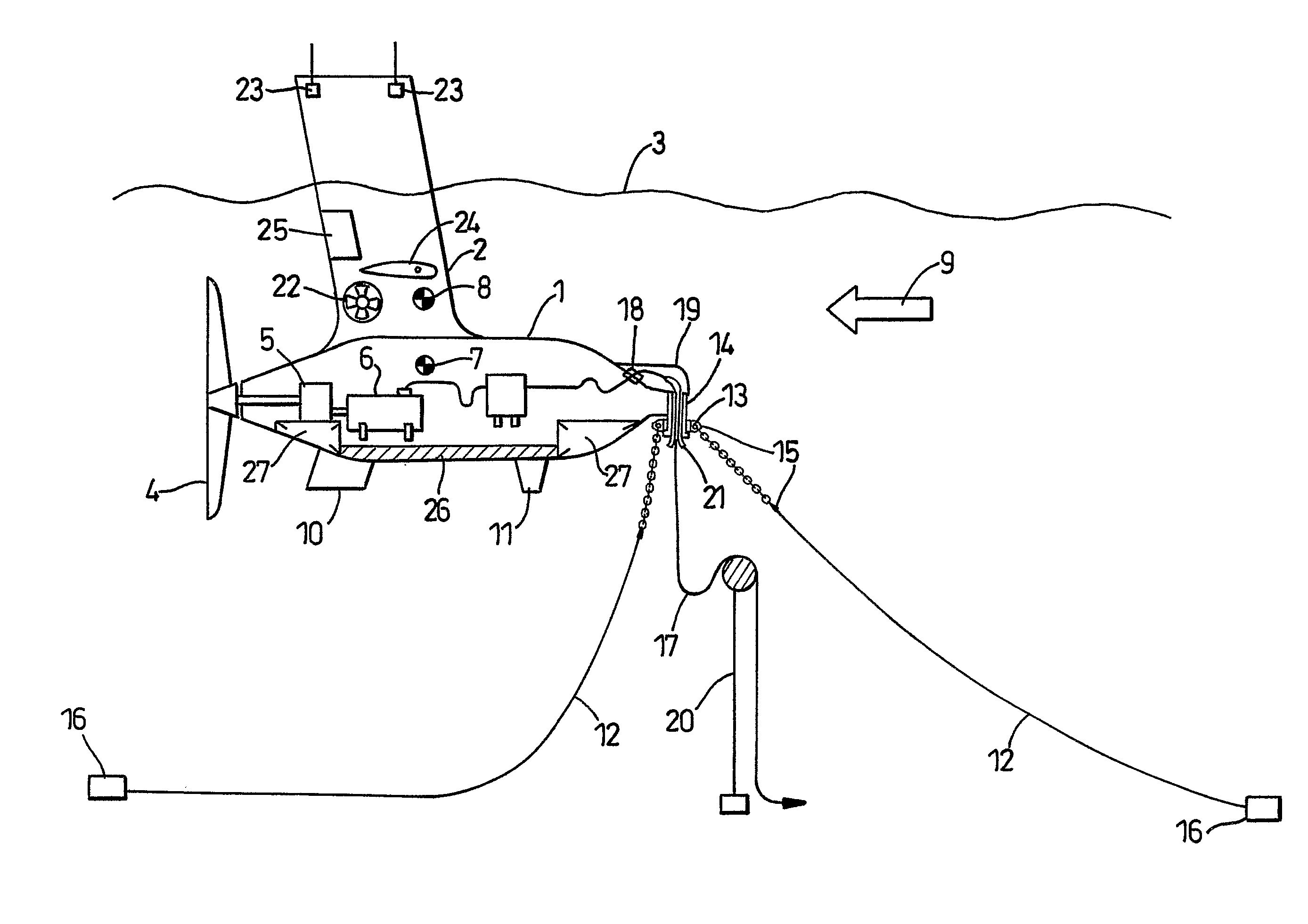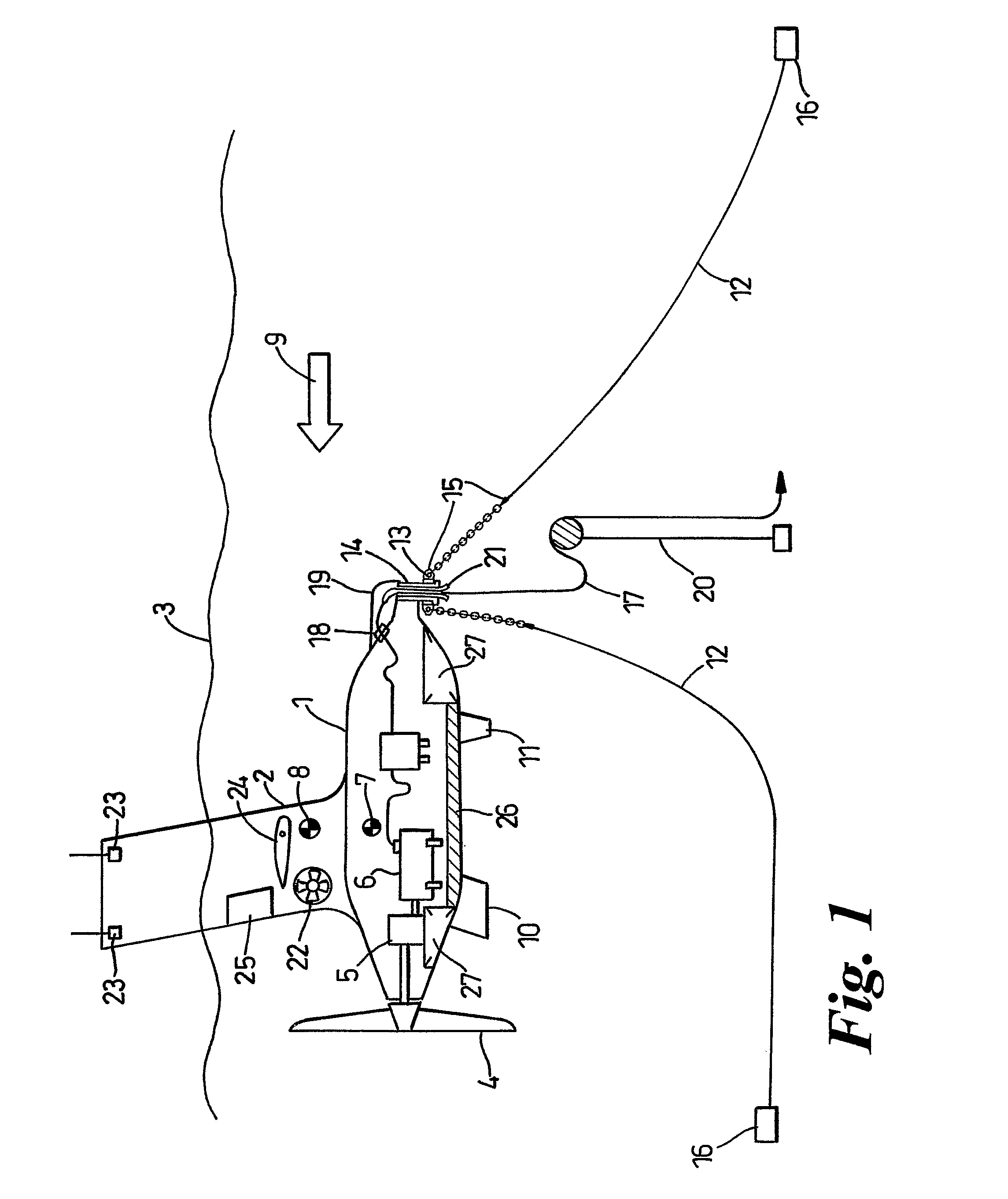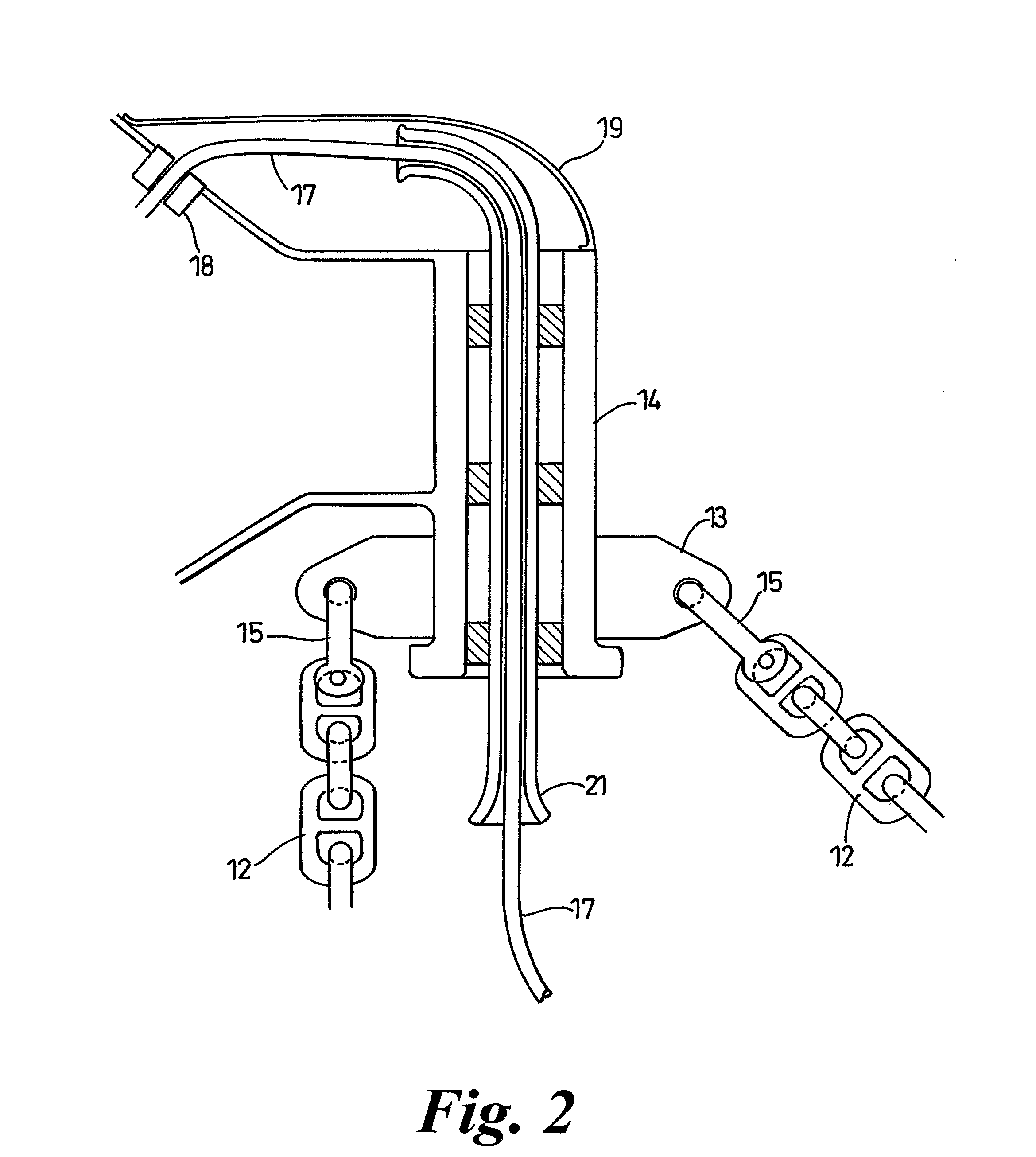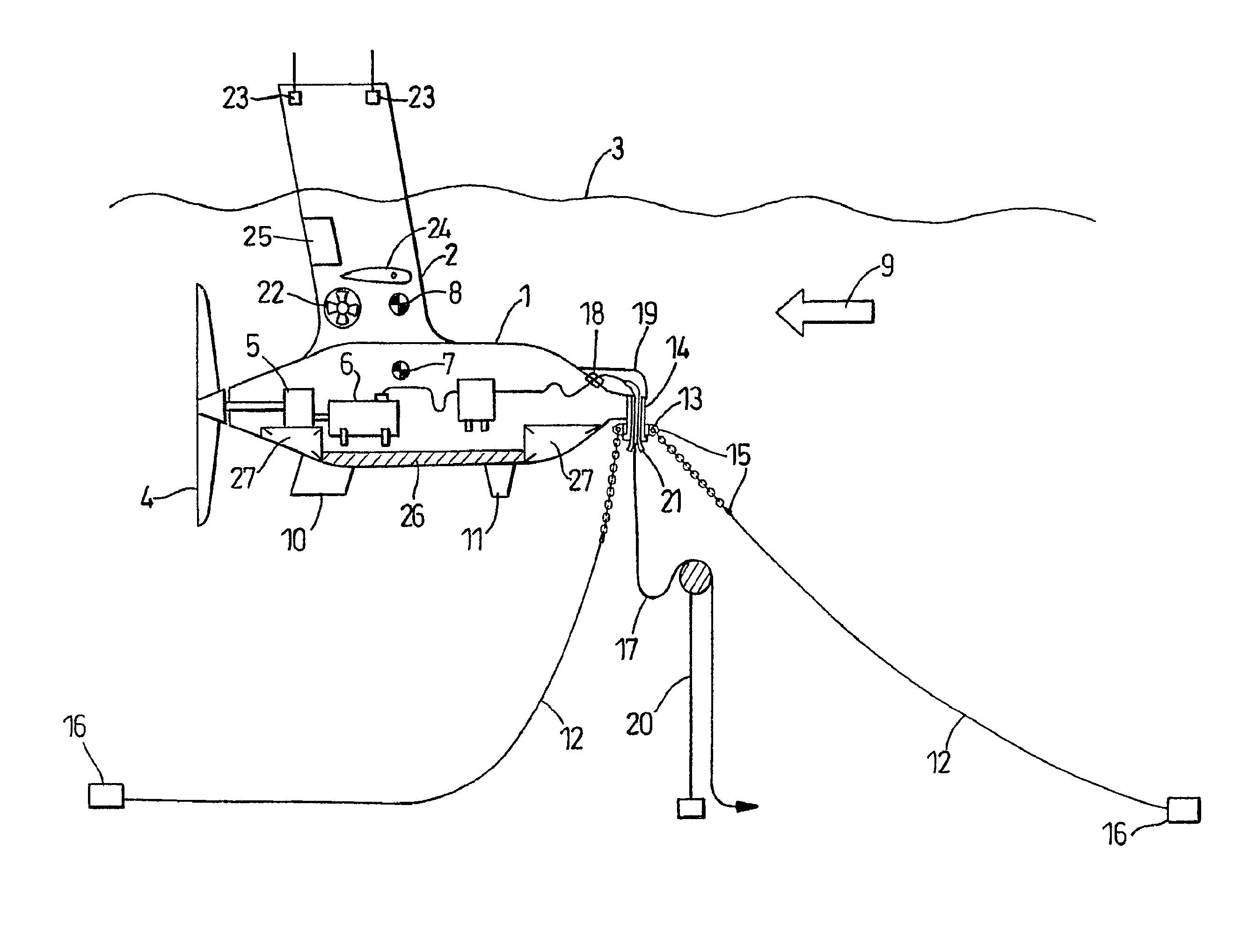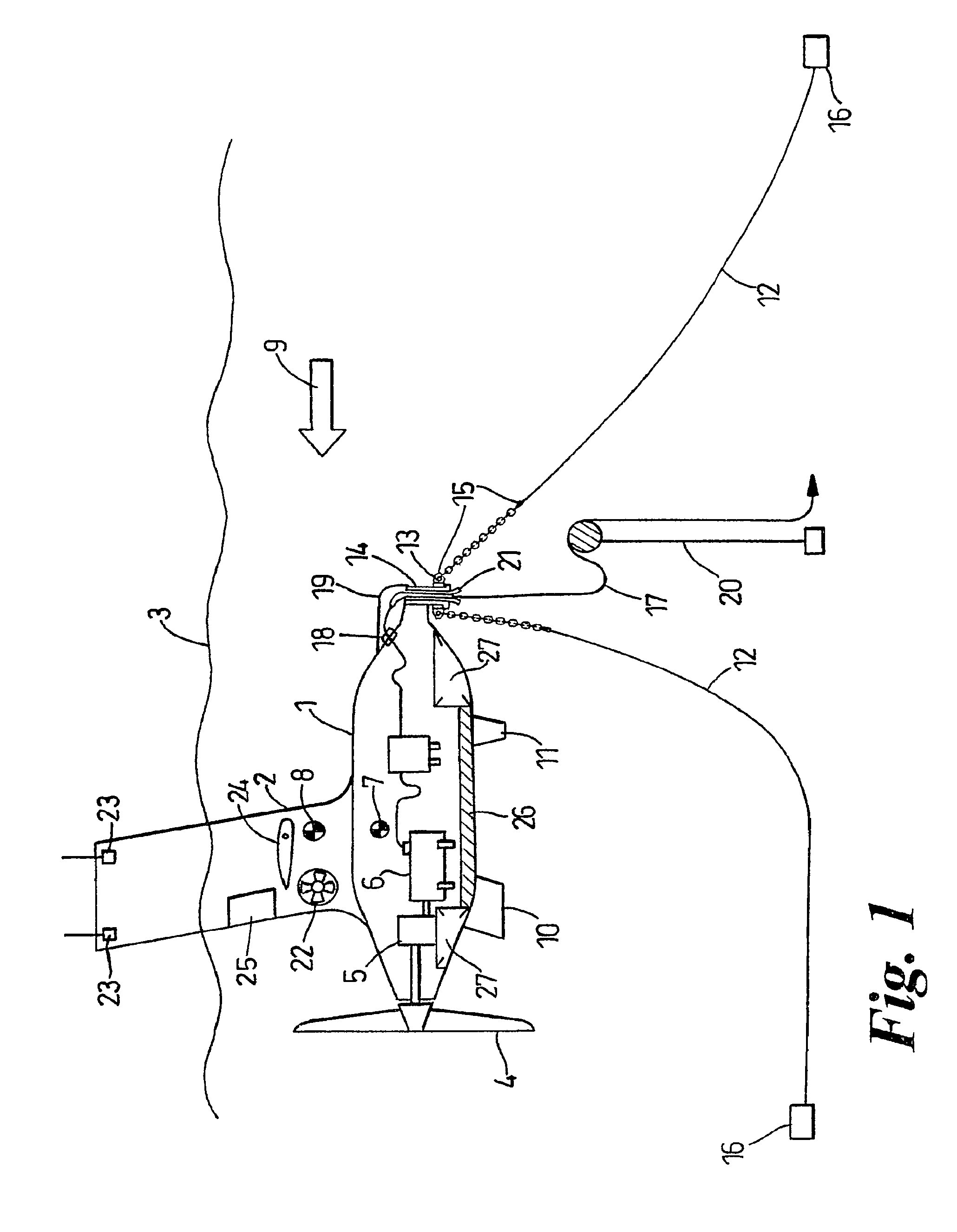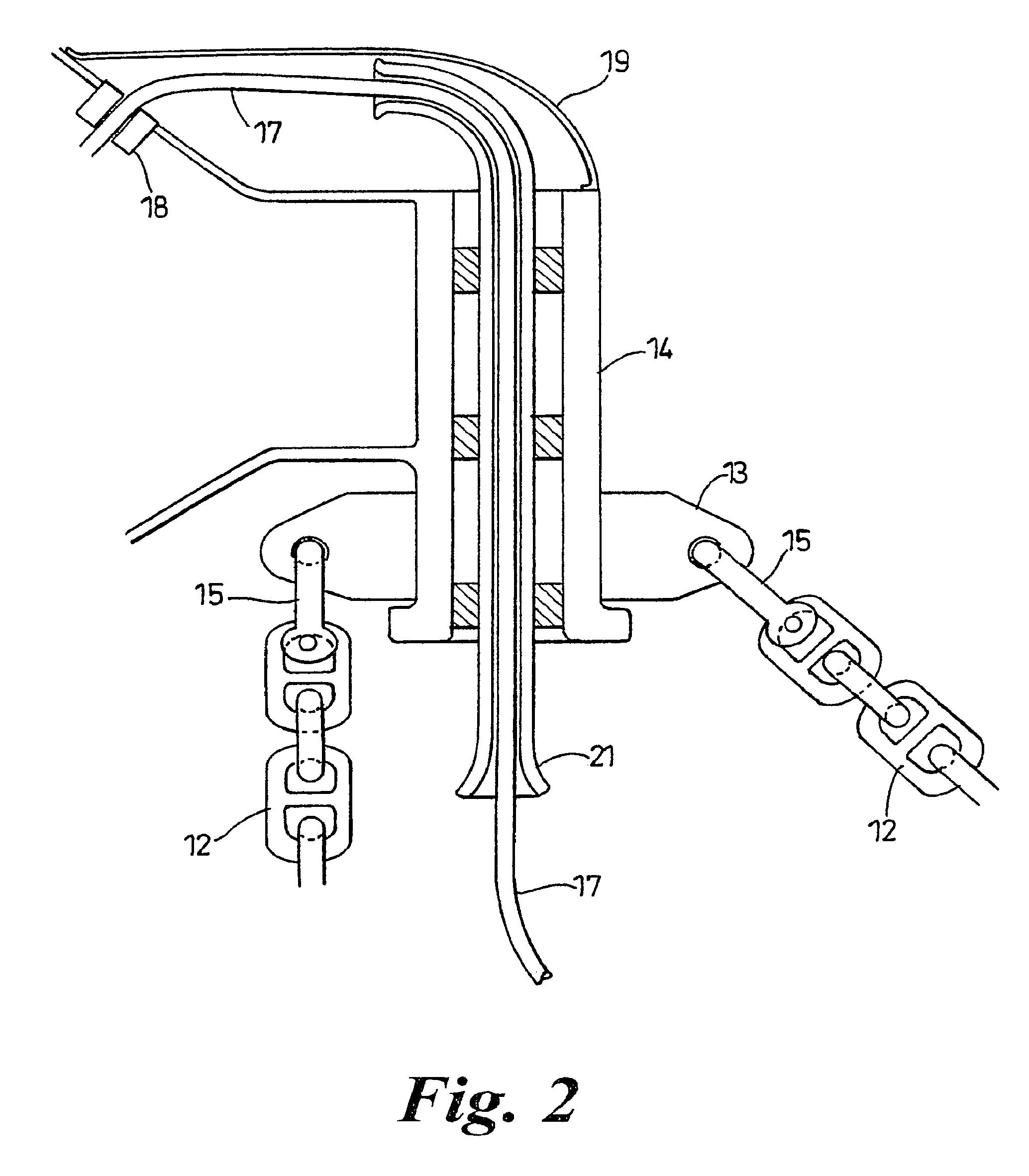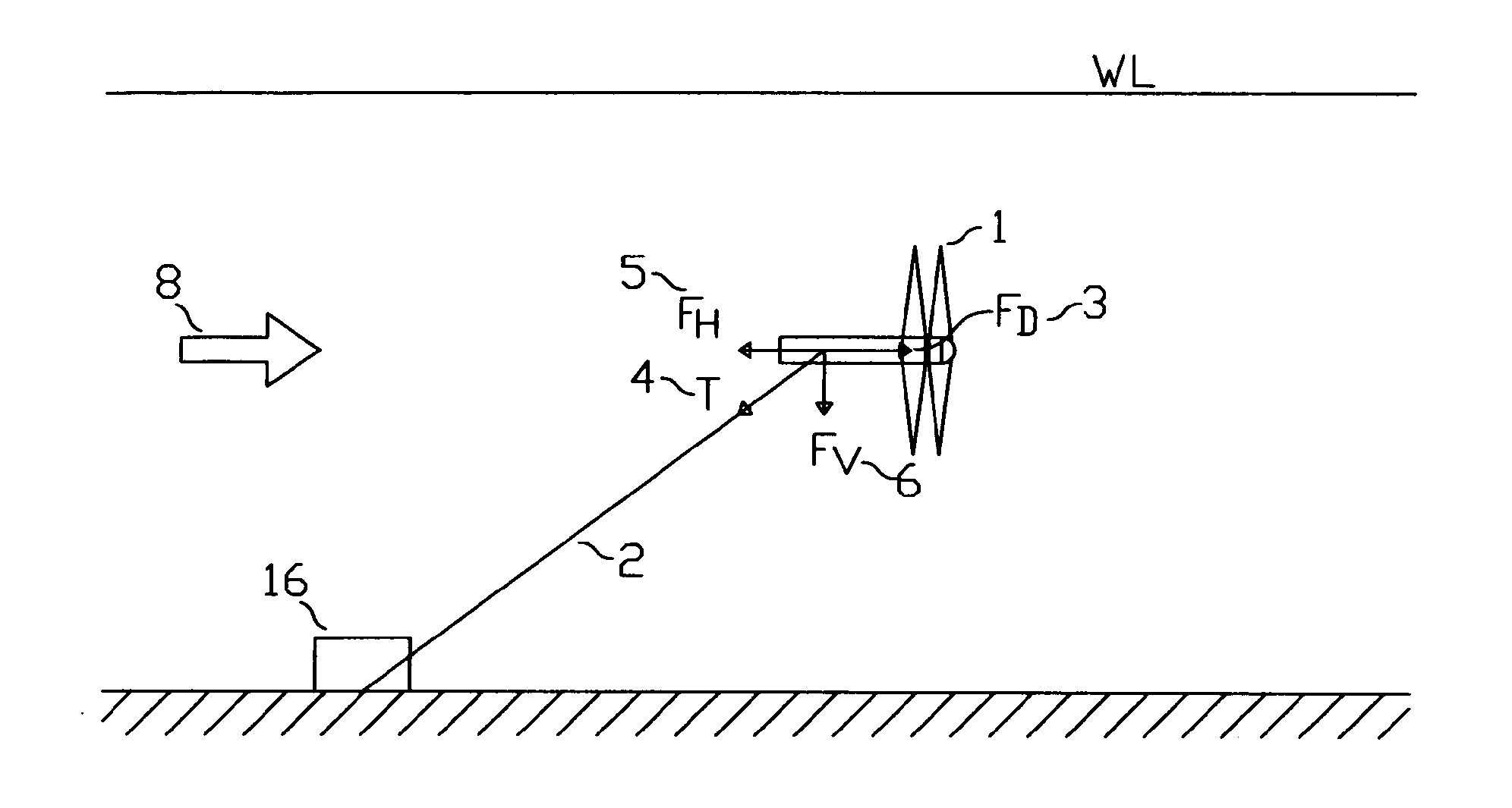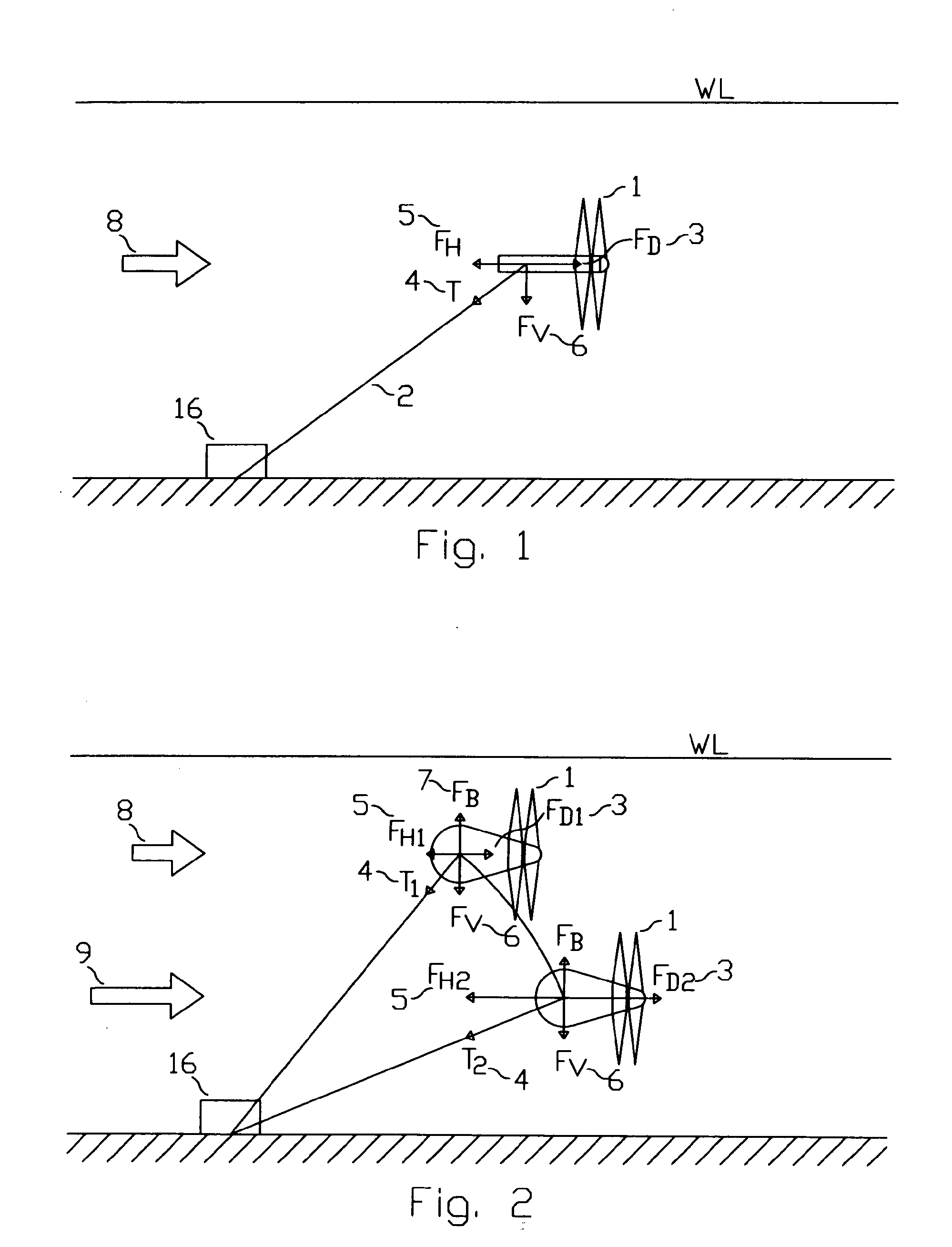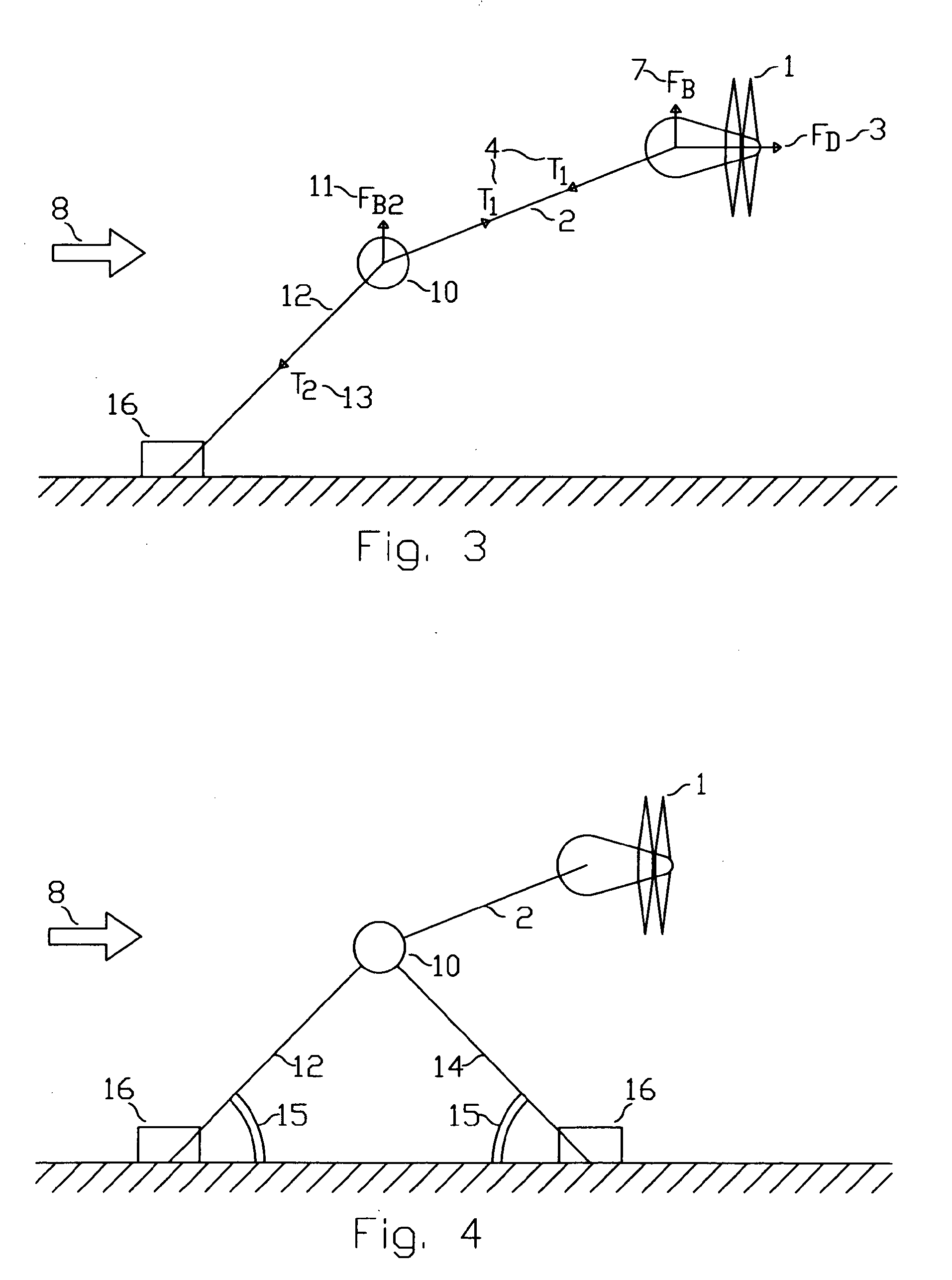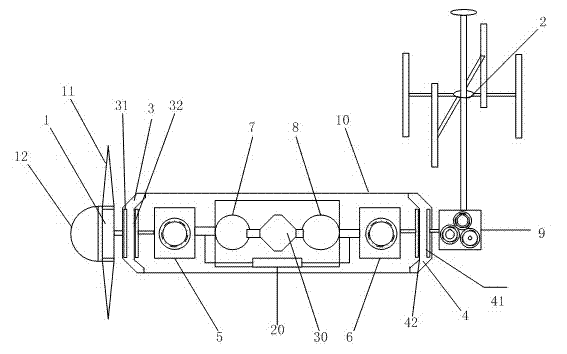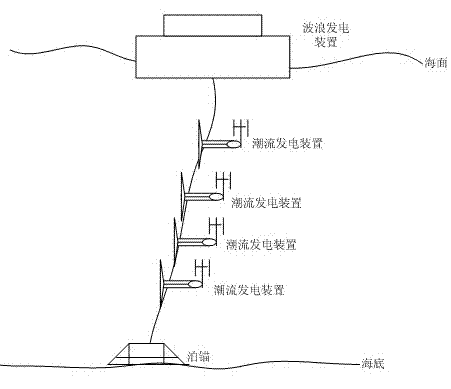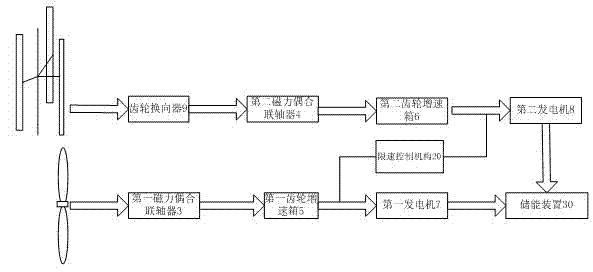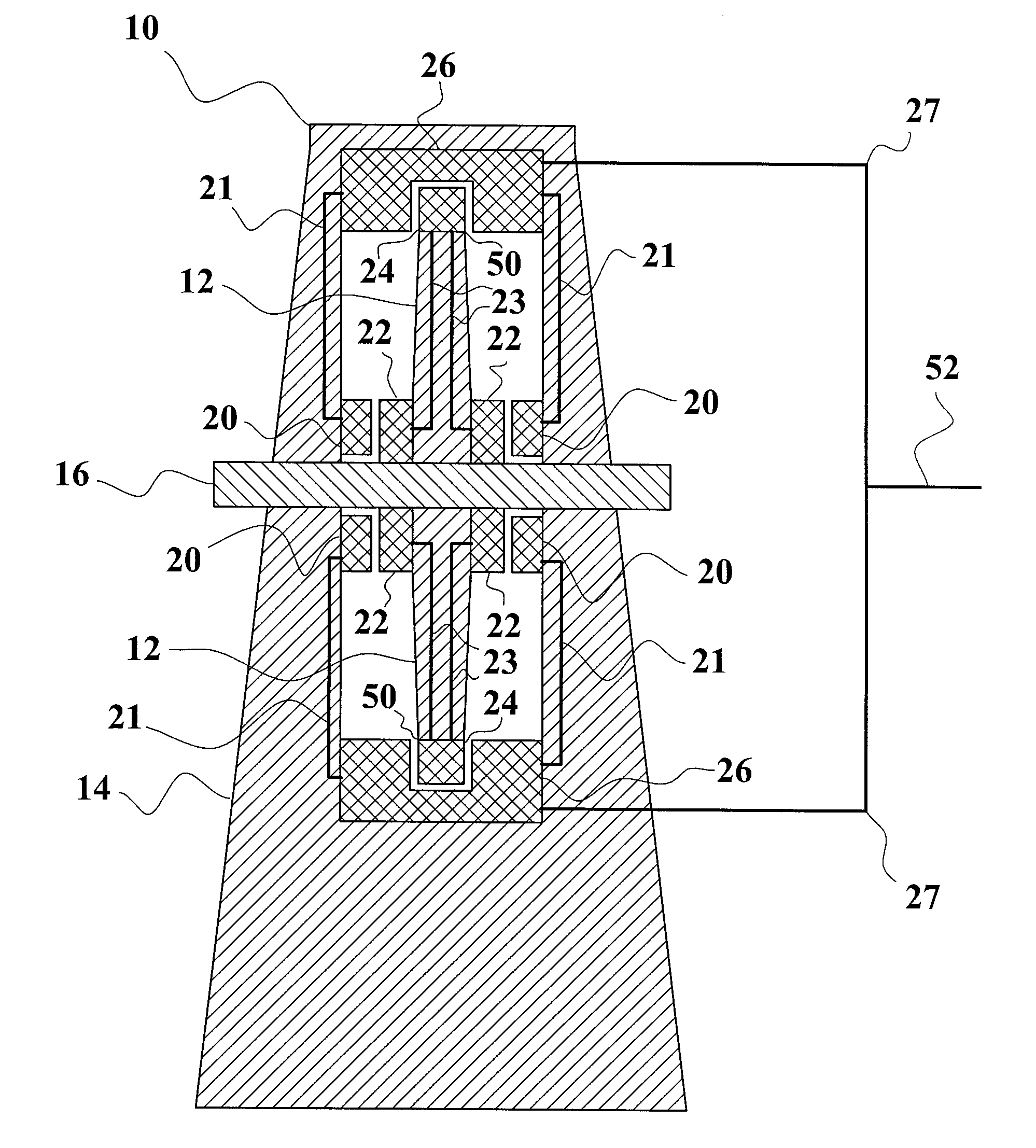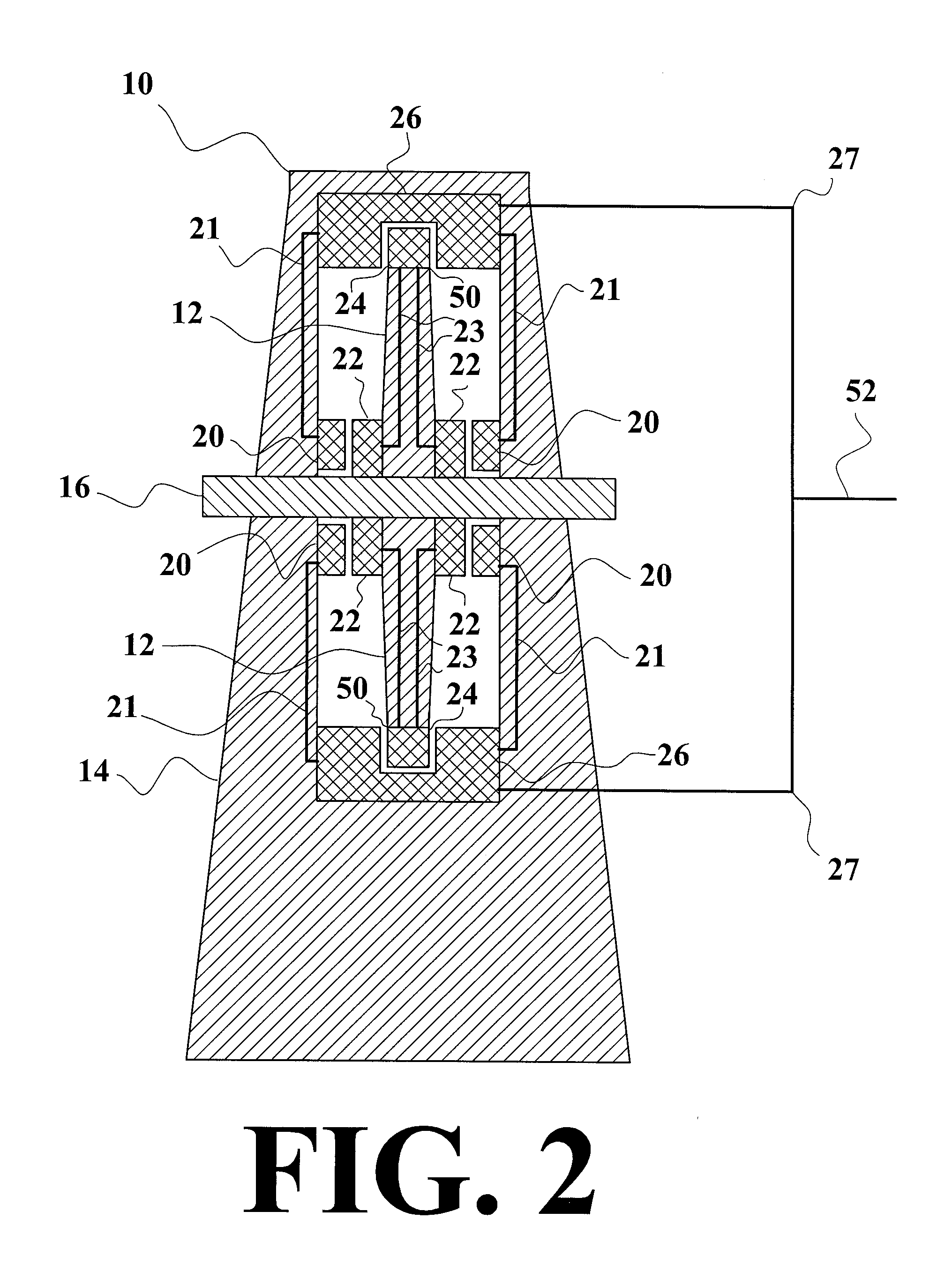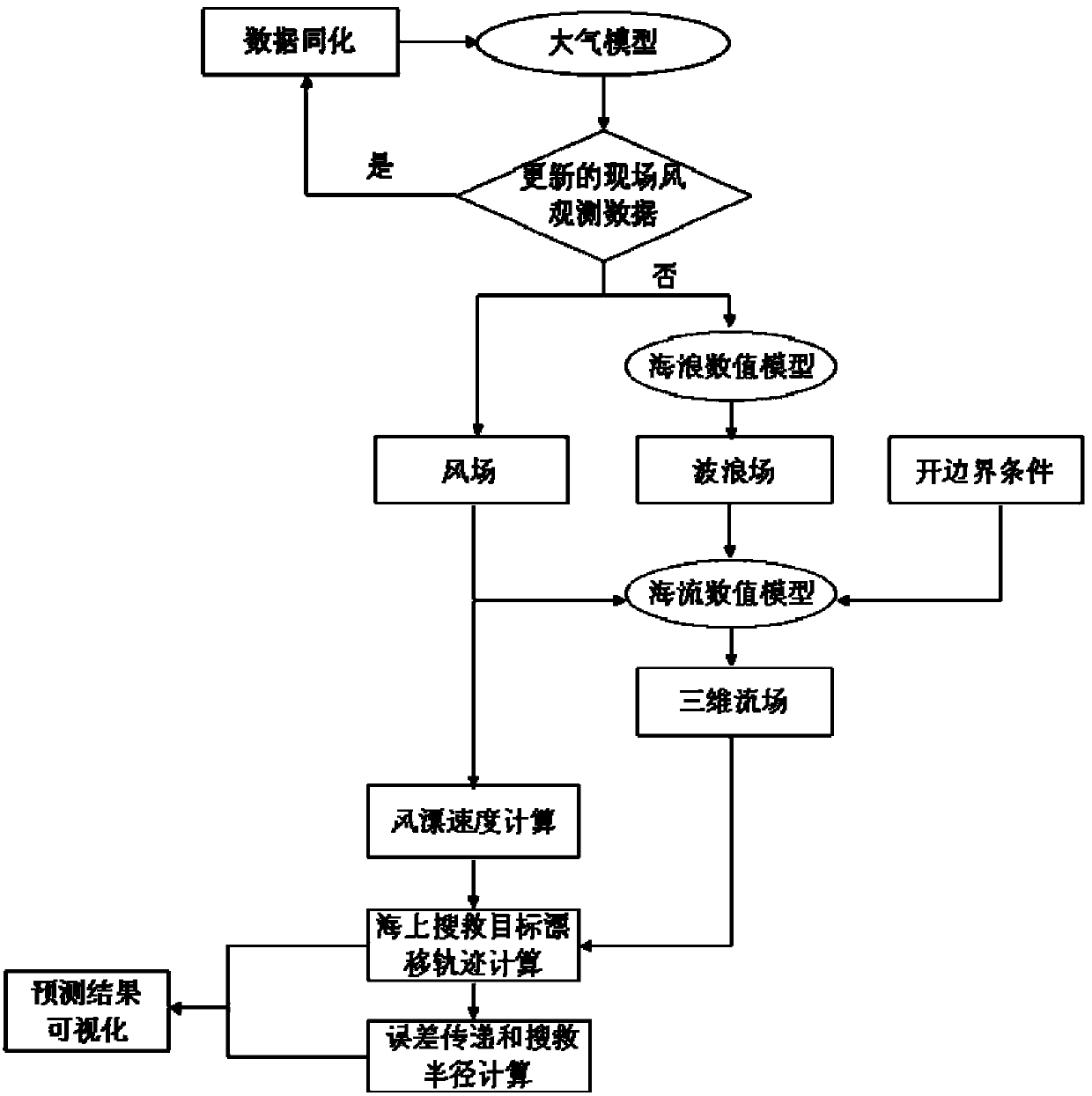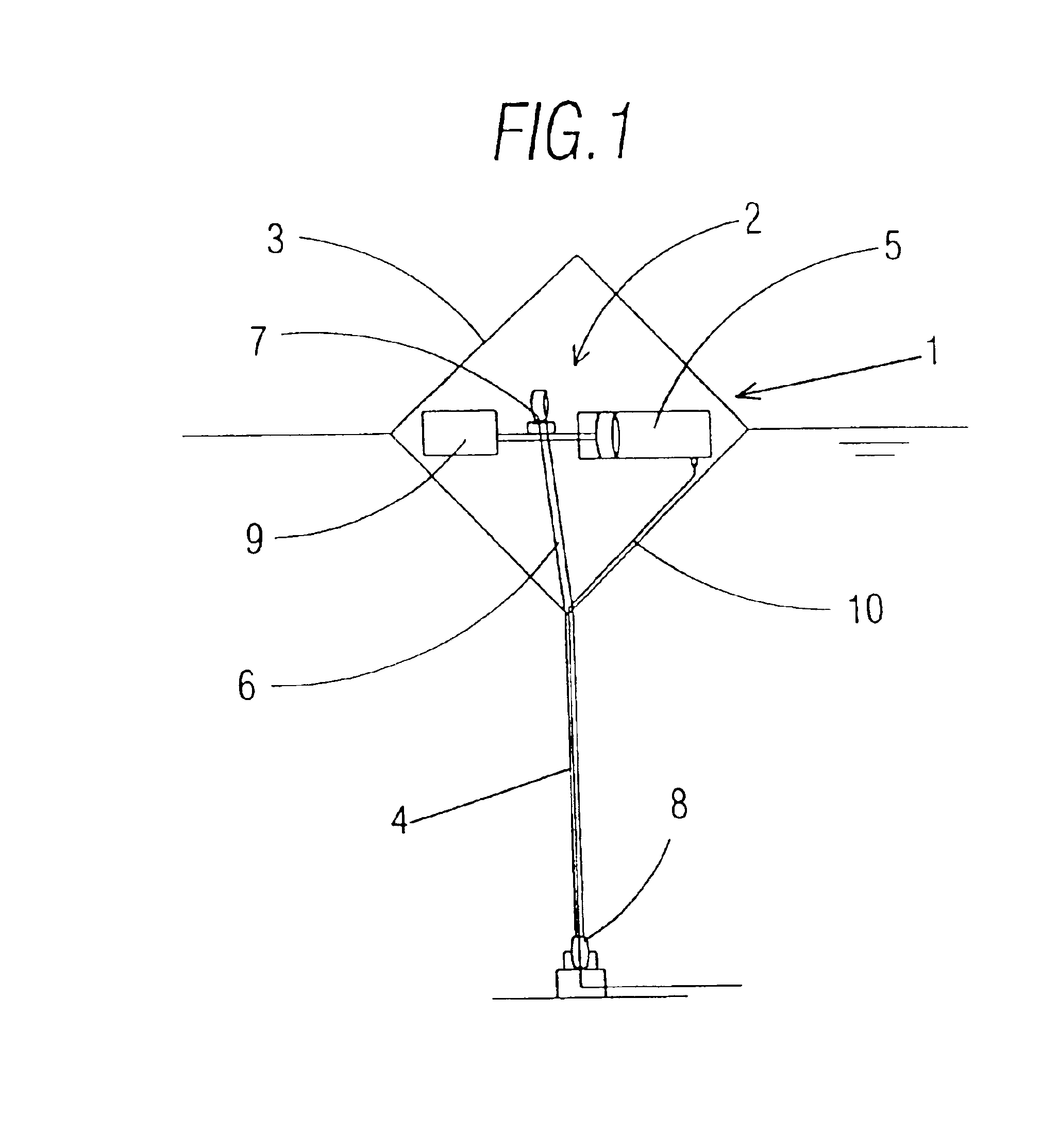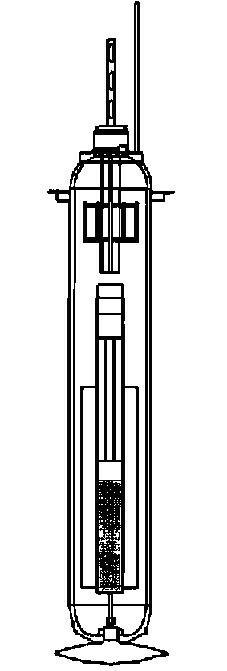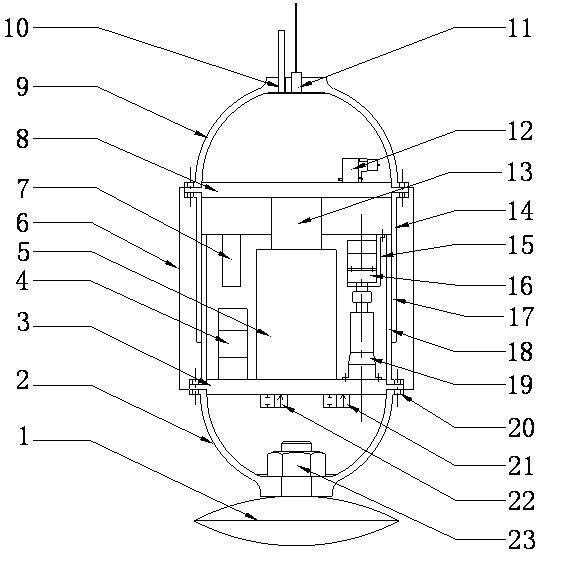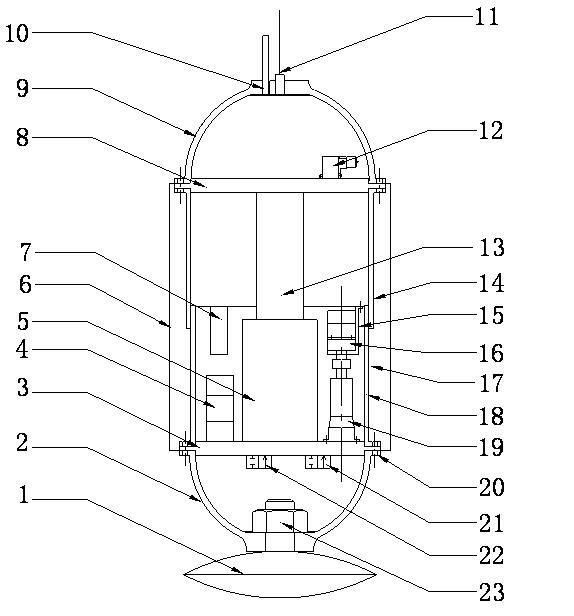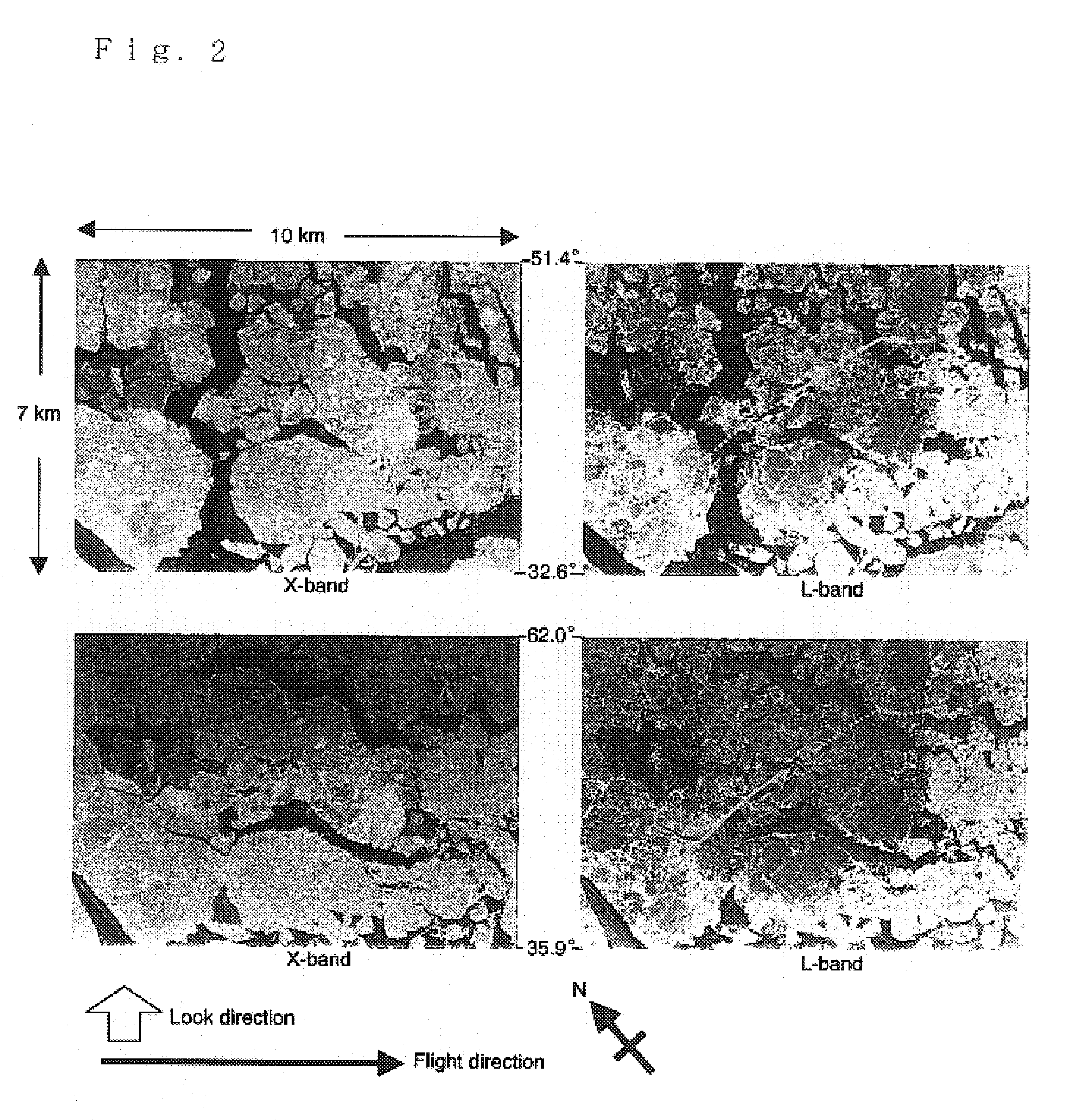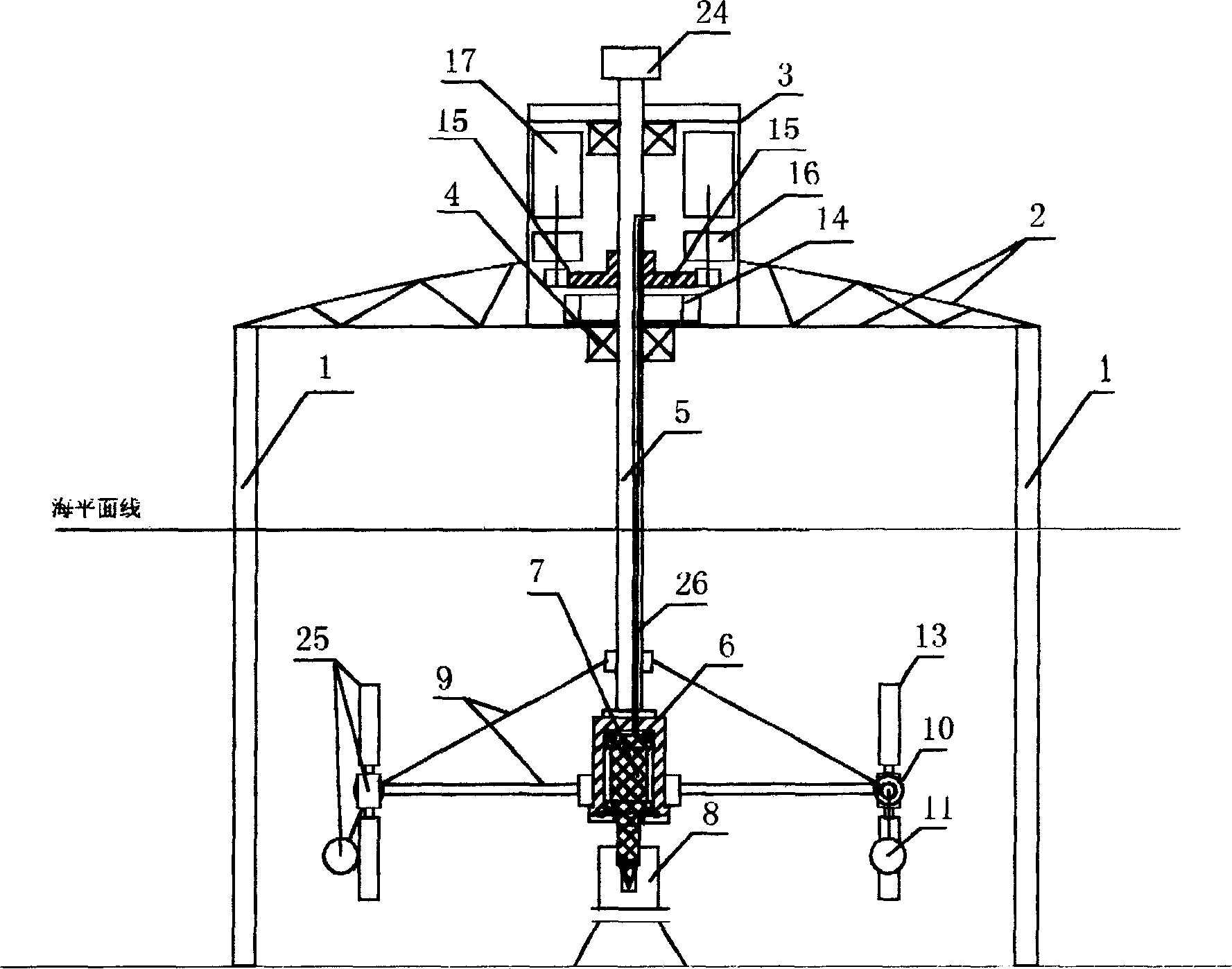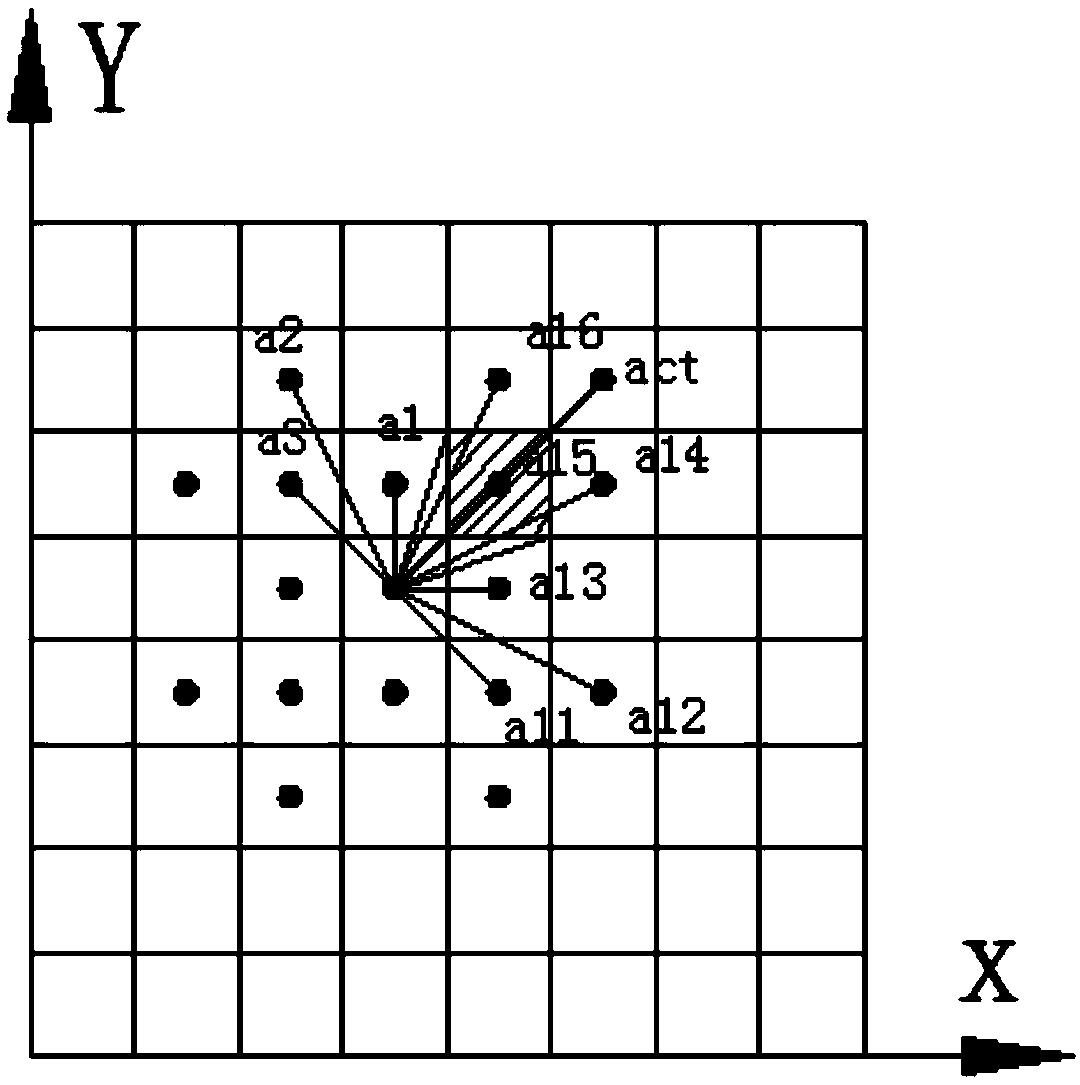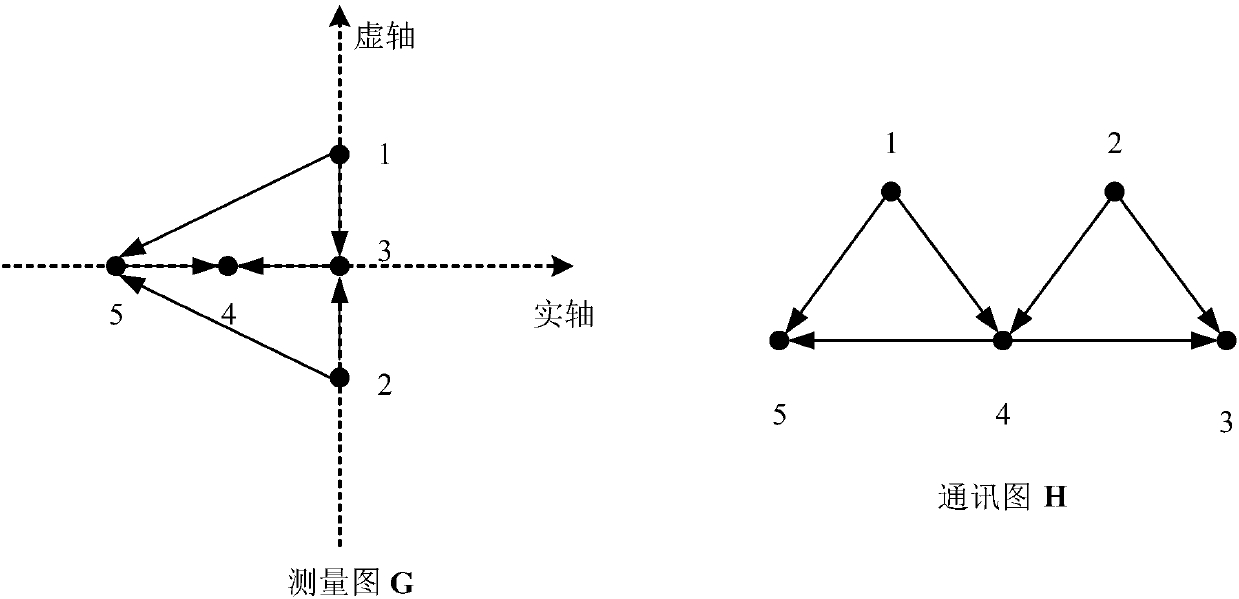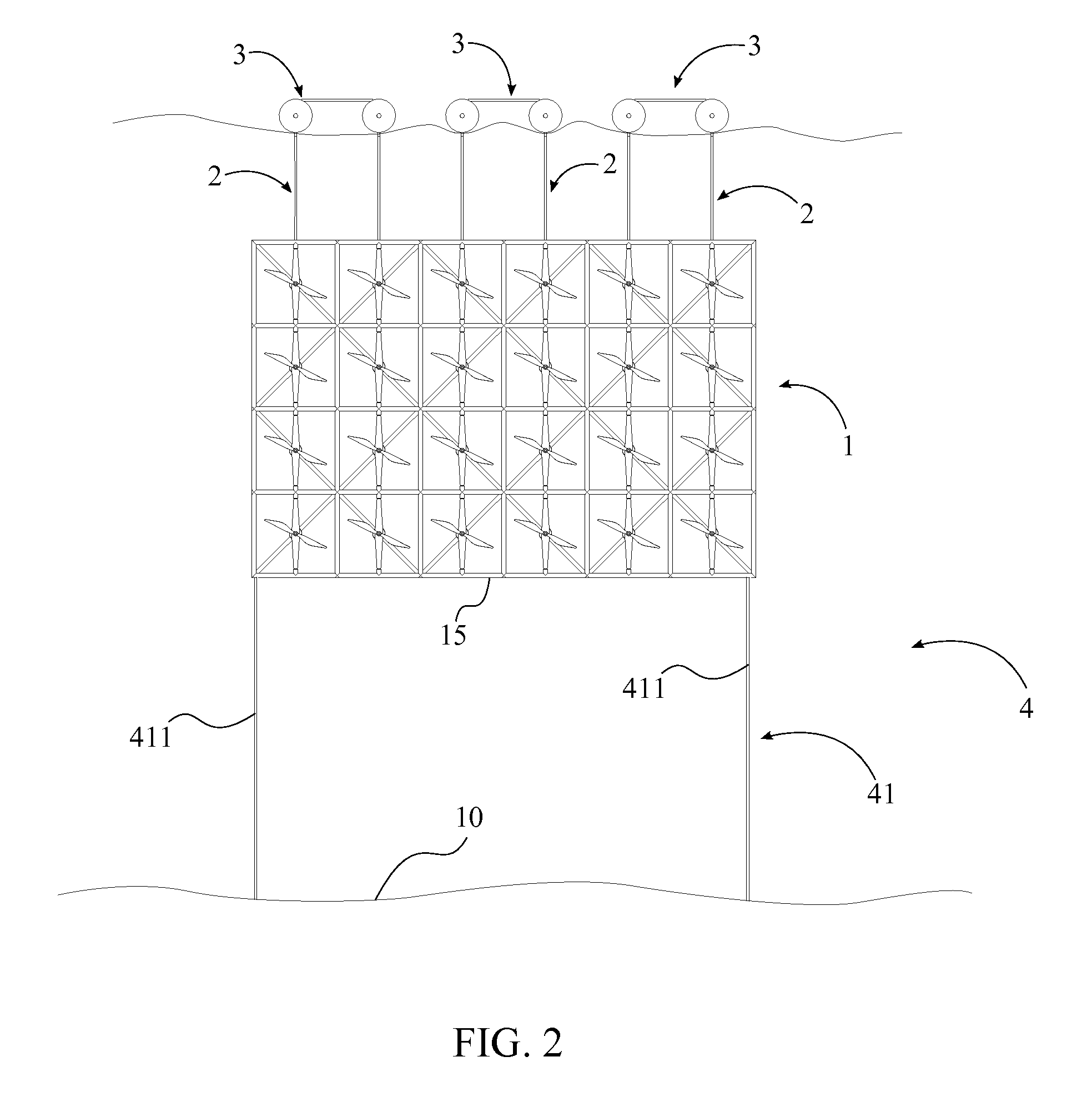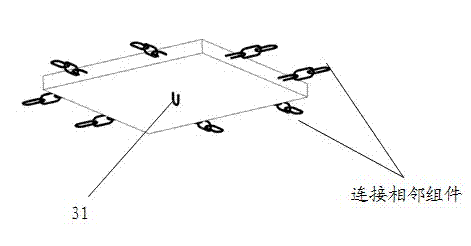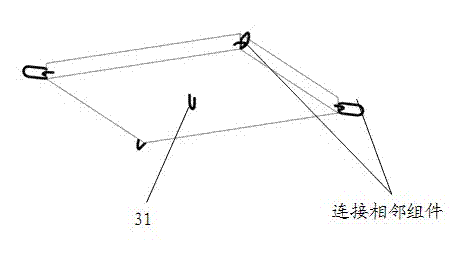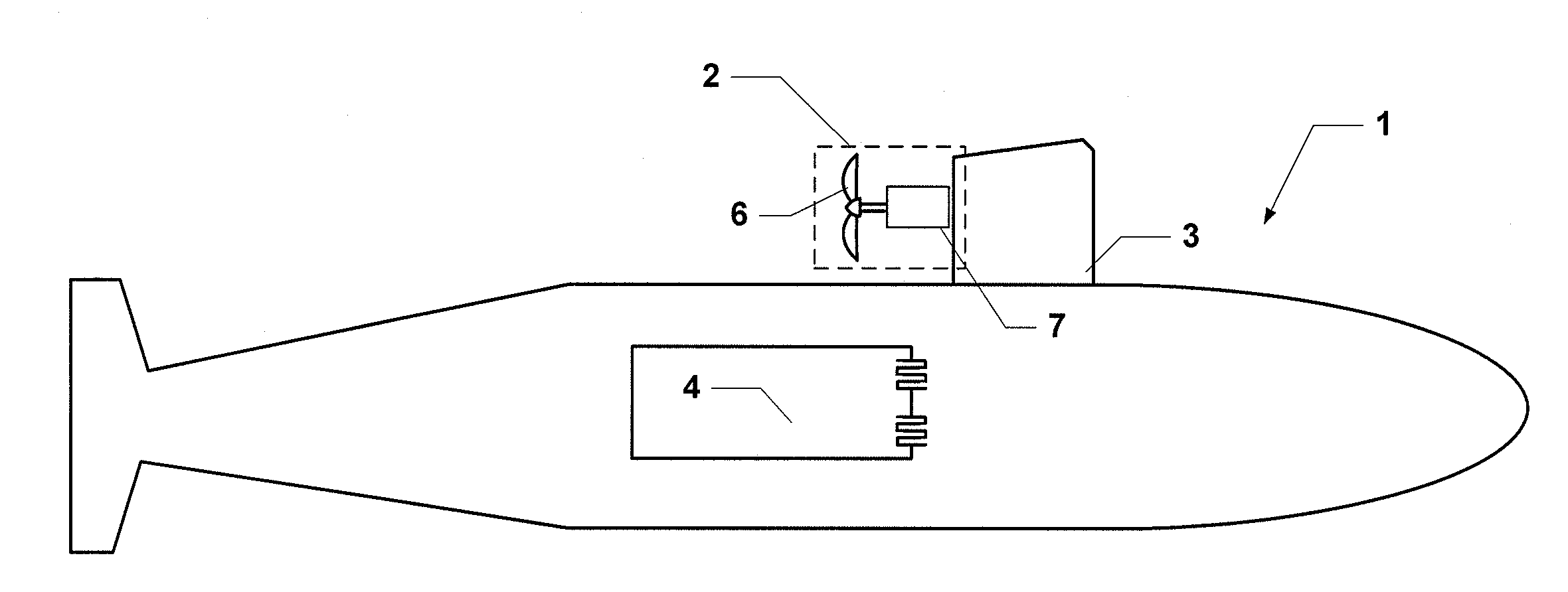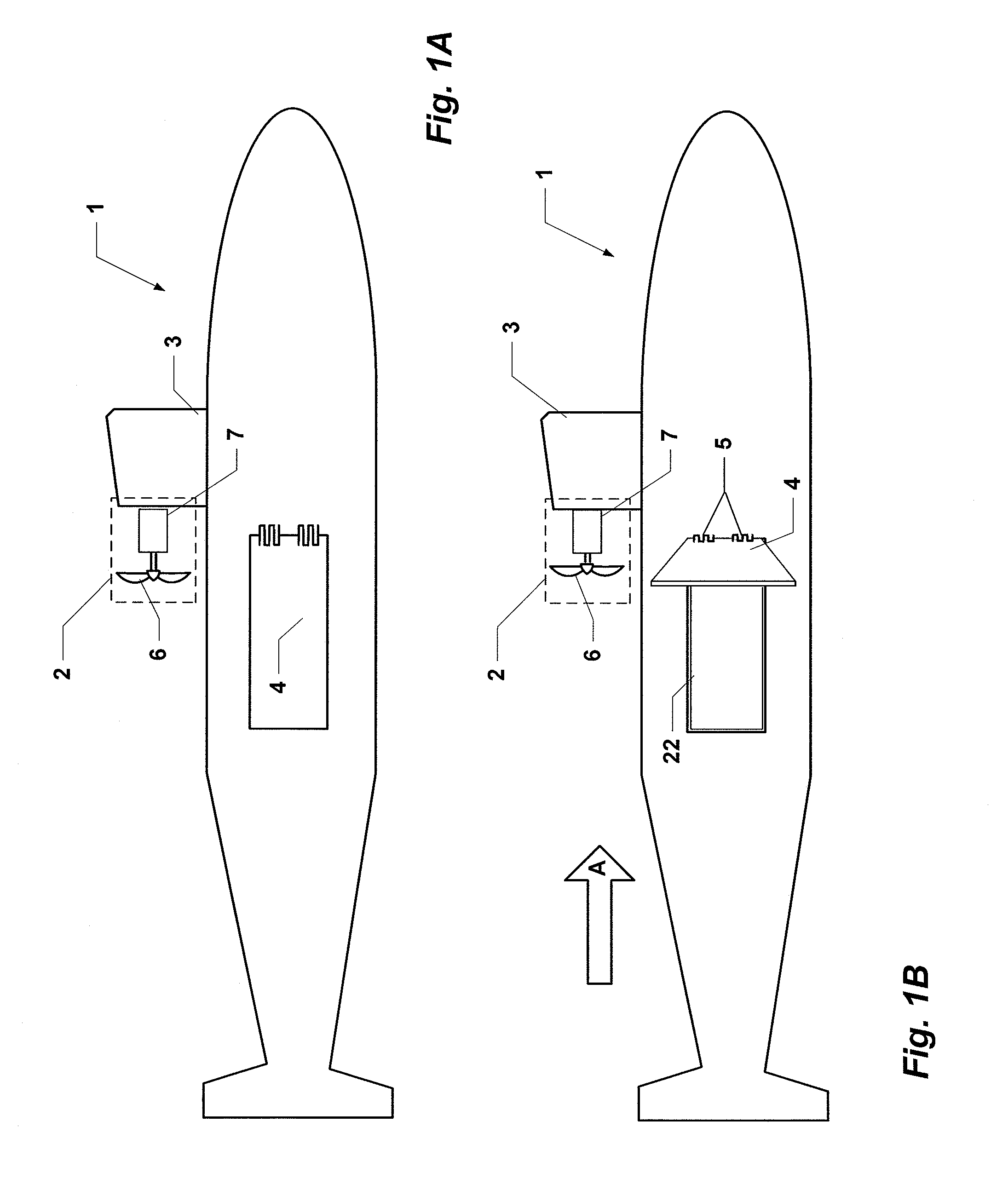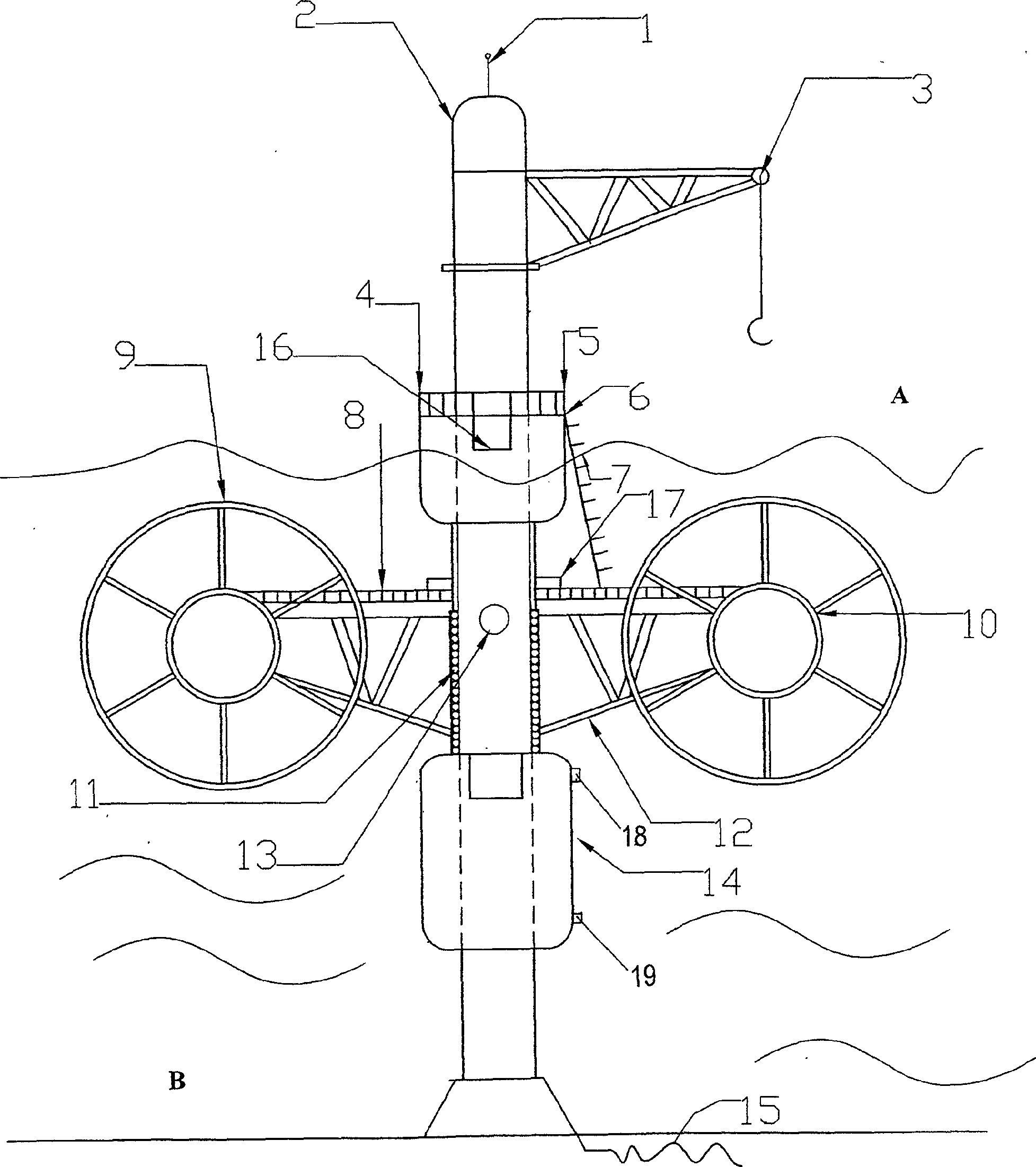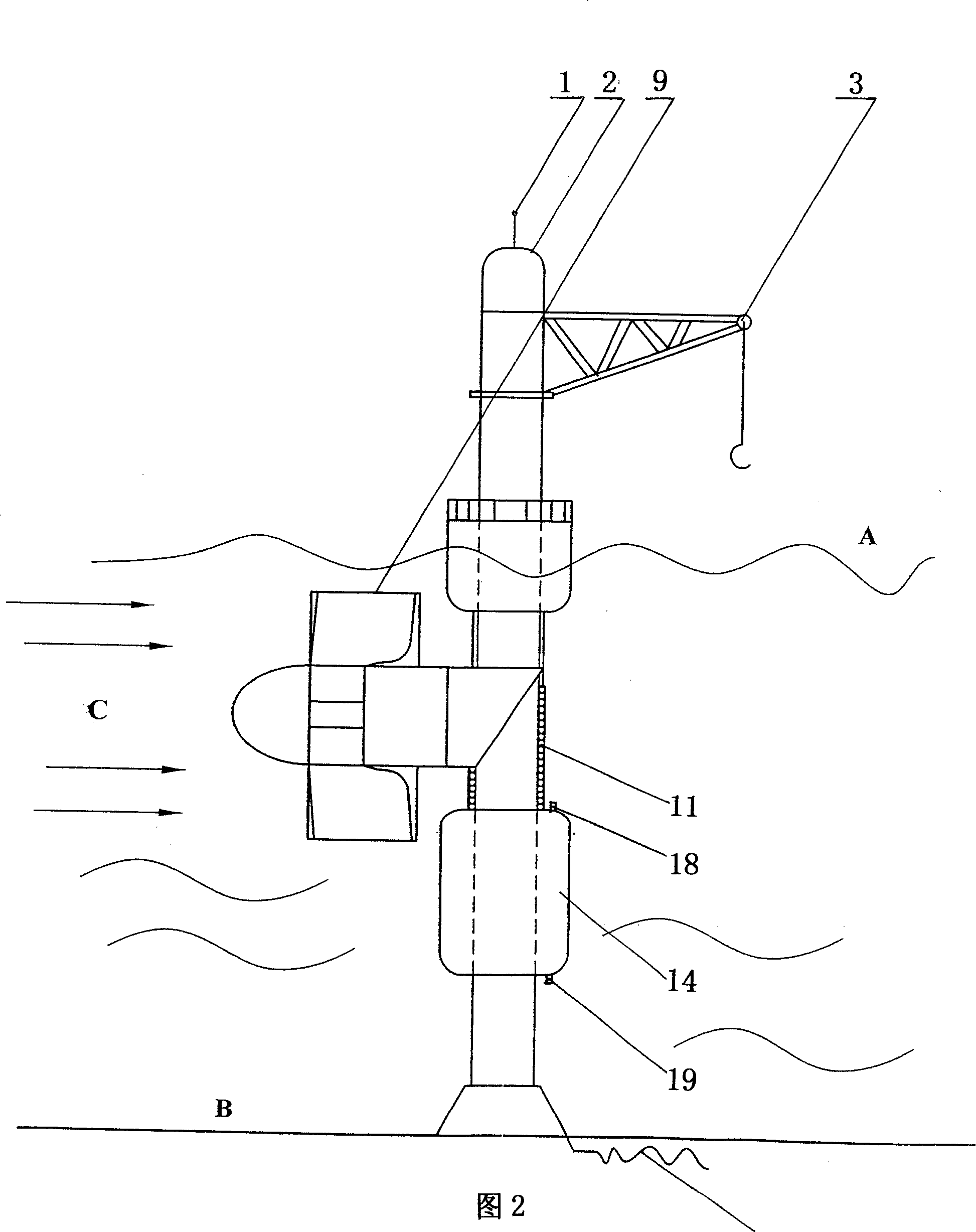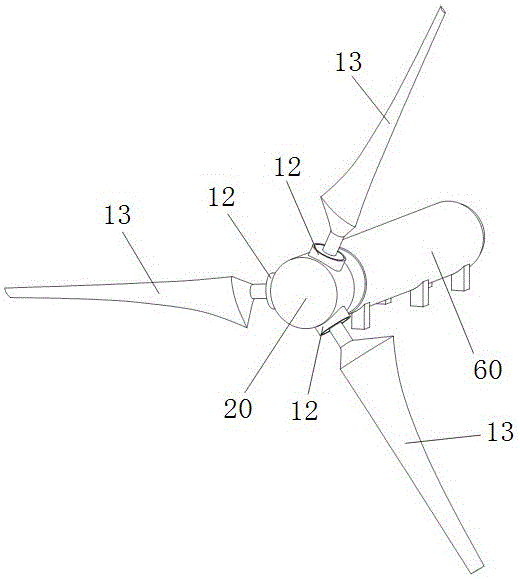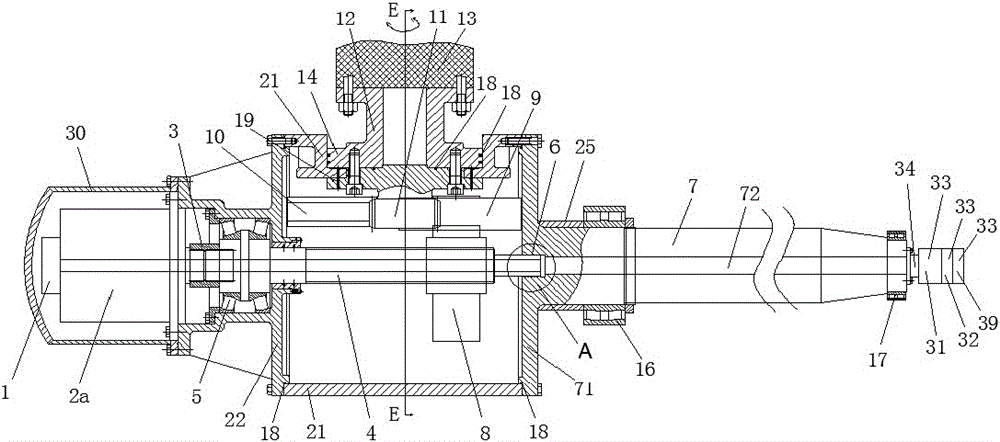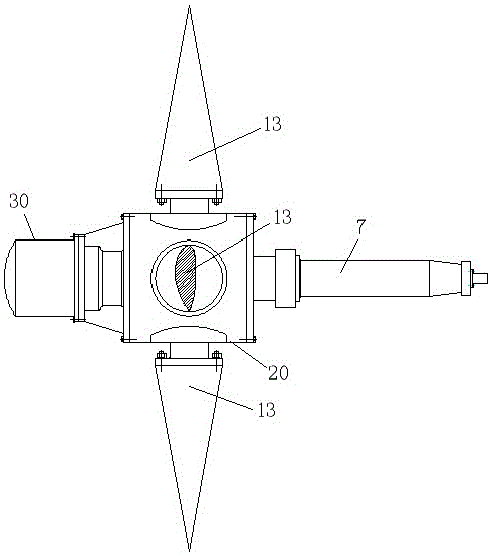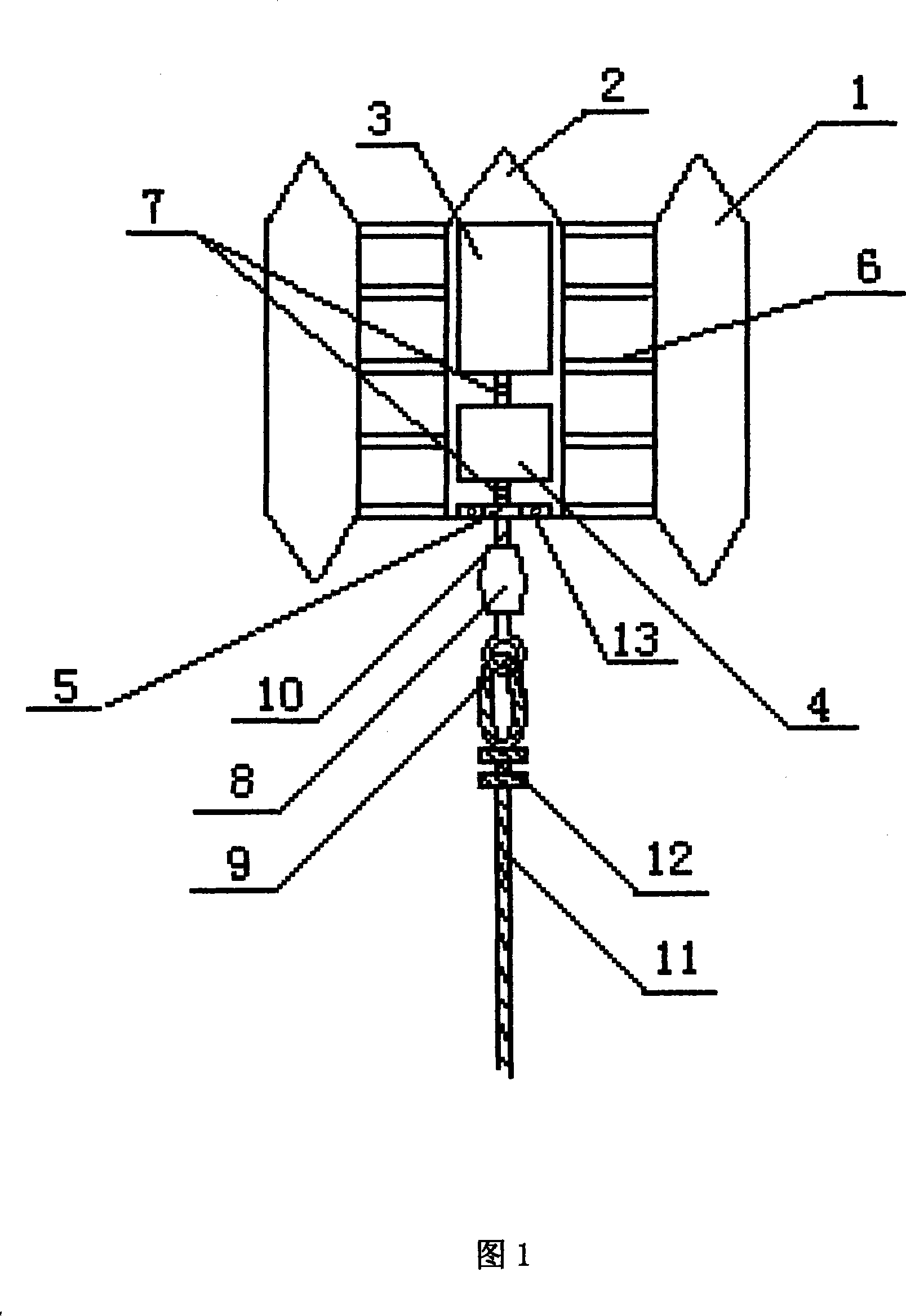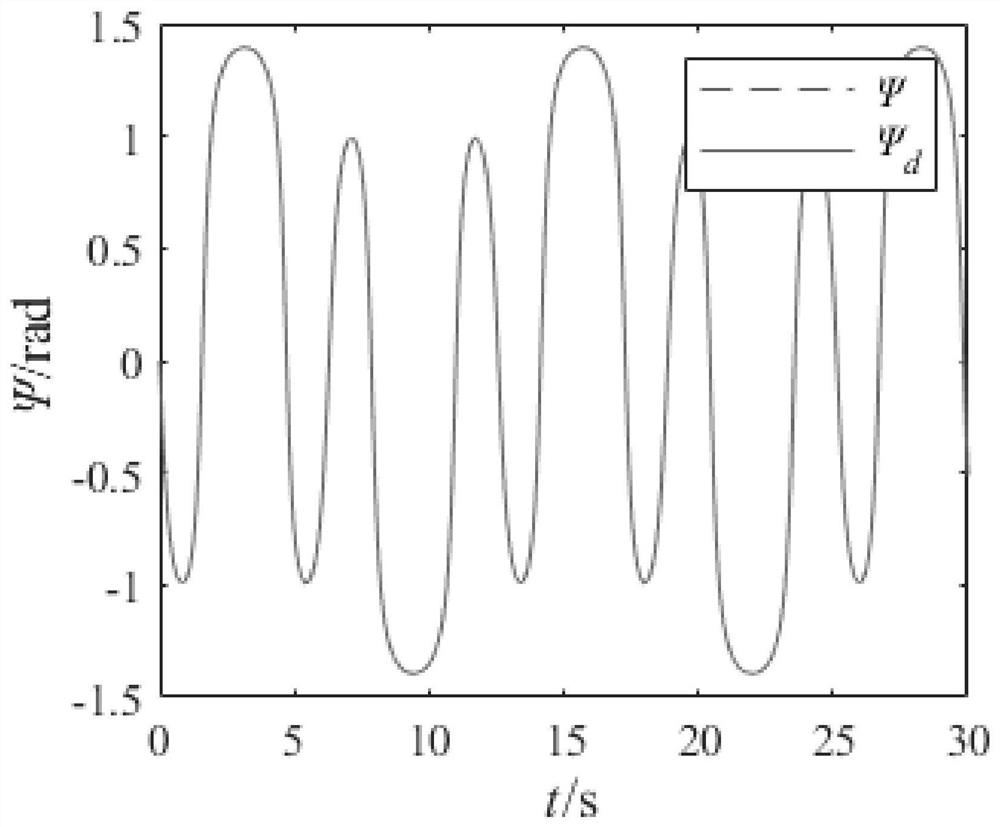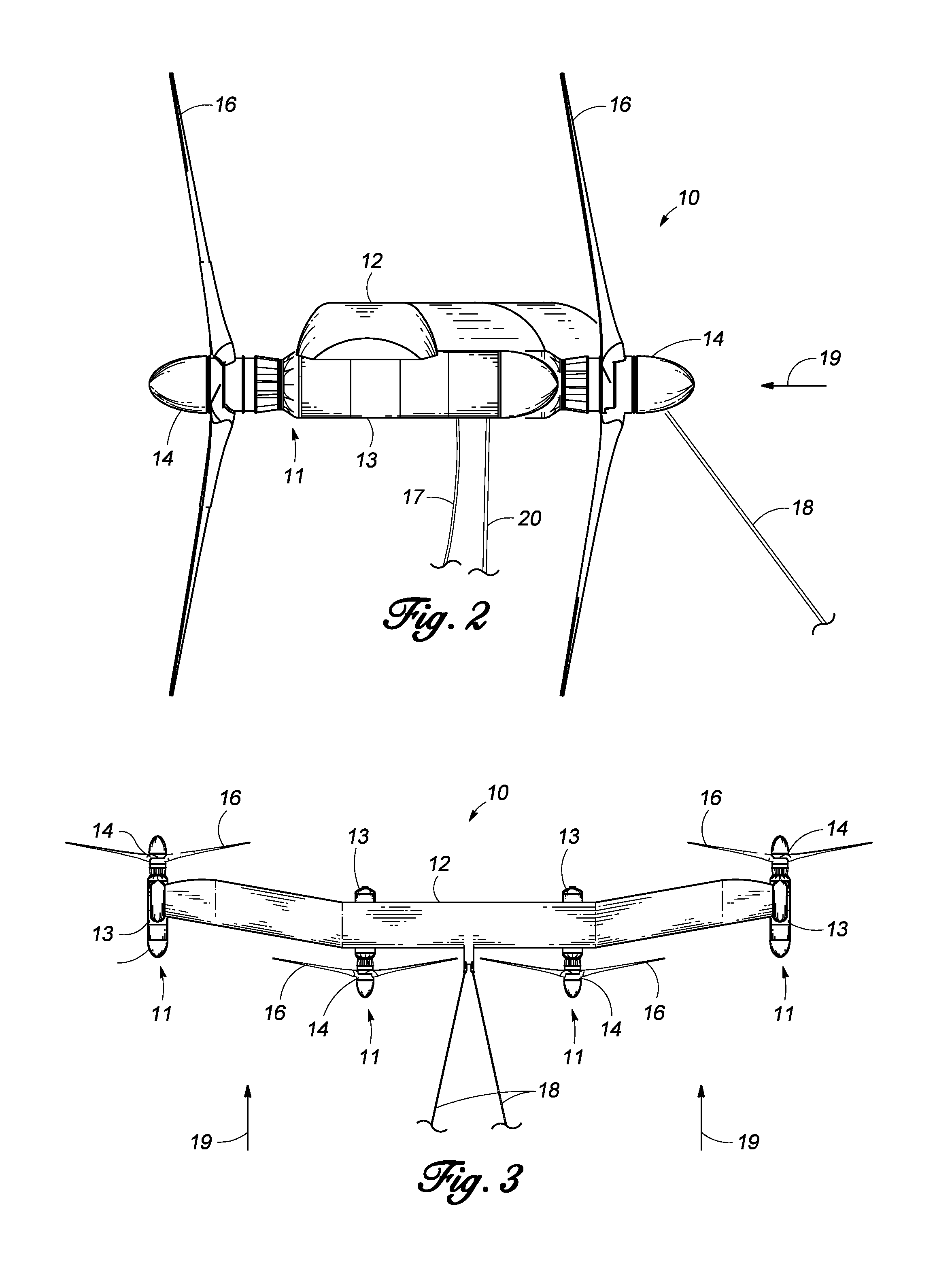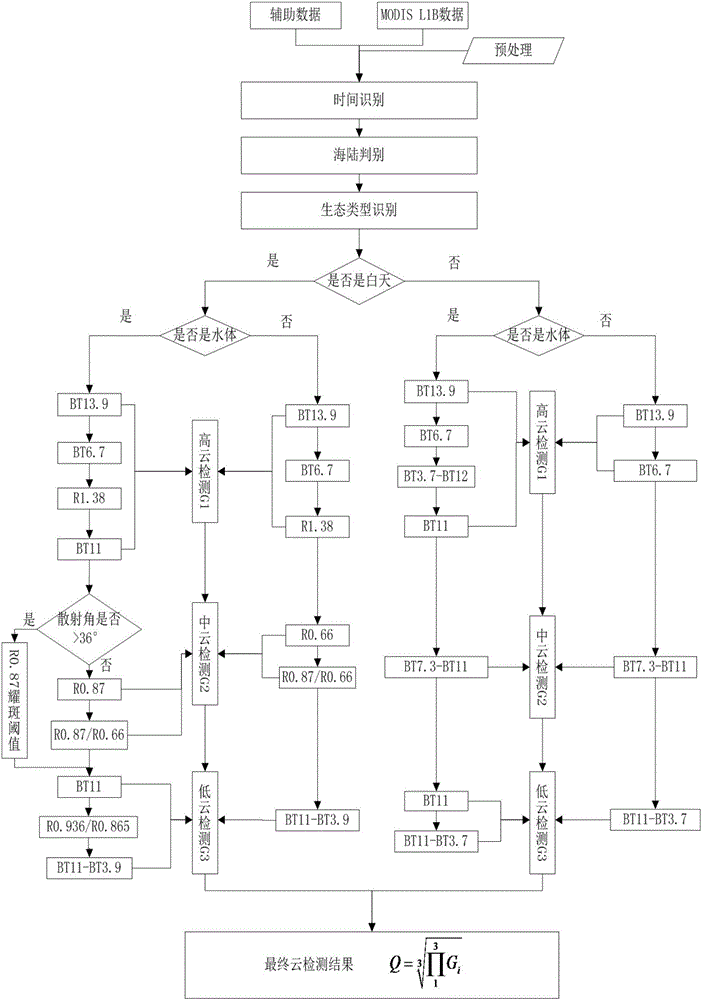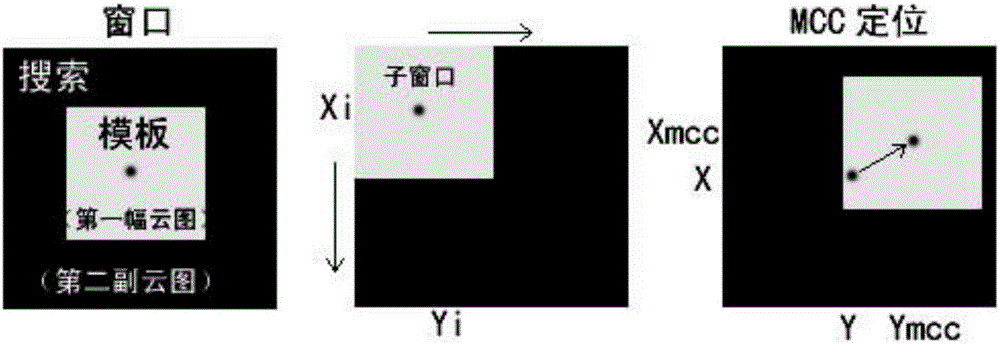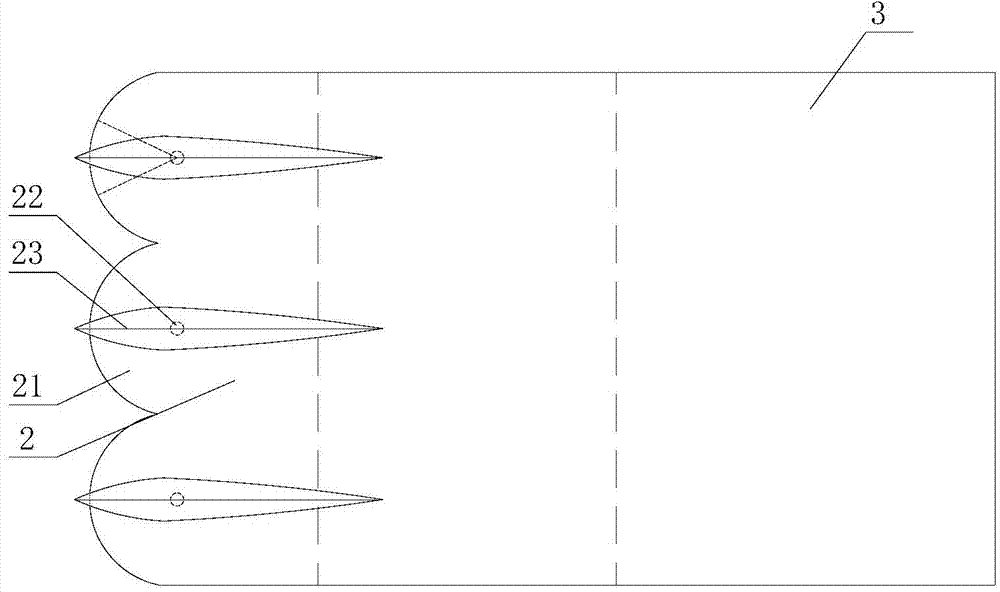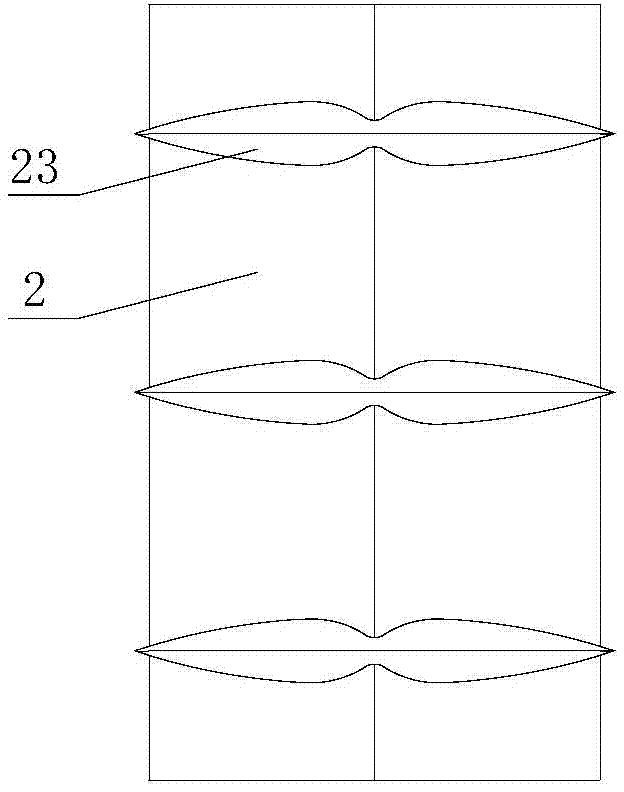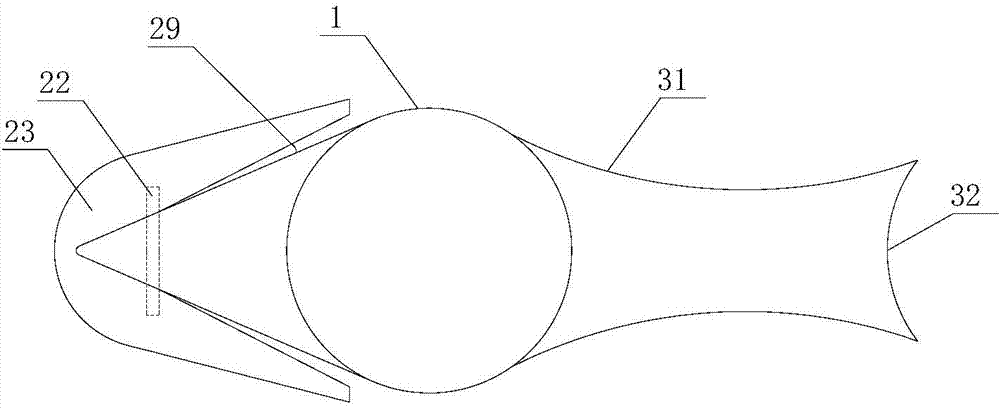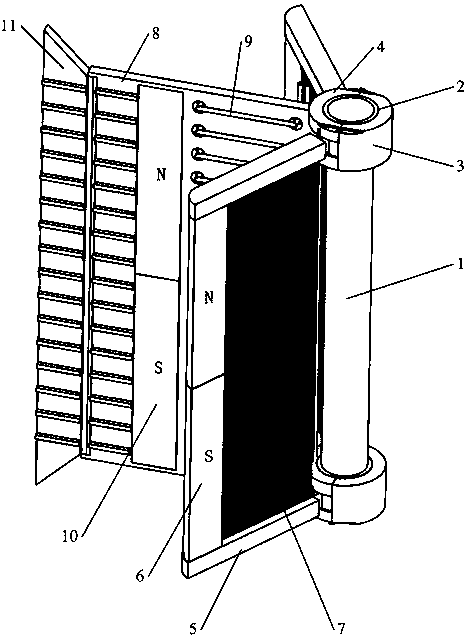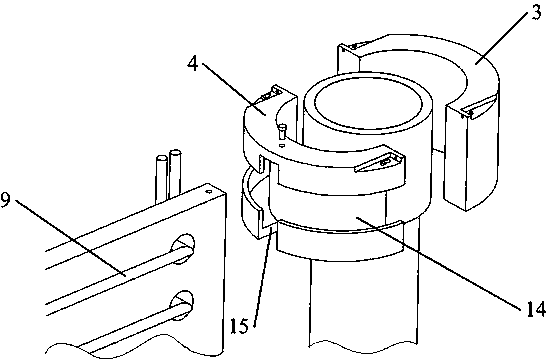Patents
Literature
Hiro is an intelligent assistant for R&D personnel, combined with Patent DNA, to facilitate innovative research.
647 results about "Marine currents" patented technology
Efficacy Topic
Property
Owner
Technical Advancement
Application Domain
Technology Topic
Technology Field Word
Patent Country/Region
Patent Type
Patent Status
Application Year
Inventor
Deployable submarine-hydroelectric generator for sea currents energy harvesting
InactiveUS20090140524A1Easy to harvestReduce global warmingFinal product manufactureGas turbine plantsOcean bottomElectrolysis
Deployable submarine hydroelectric generator for conversion of kinetic energy of deep ocean currents into electricity by having an electric generator mounted in a sealed hydrodynamic, buoyant vessel with tail fins, and connected by a shaft to a rotary turbine blades at the tail end of the submarine vessel, which vessel is anchored at desired depth to the bottom of the ocean by a cable. The drag of the turbine blades causes the vessel to self-steer against the direction of the ocean current. An electric cable is also provided, connecting said electric generator with electric grid on the land. Such generator is out of sight, unlike windmills, and is environmentally friendly to the sea life, due to slow rotating blades. This clean electricity can also be used for production of low cost hydrogen by electrolysis of sea water.
Owner:KEJHA JOSEPH B
Deepening controlling method of underactuated automatic underwater vehicle based on neural network back stepping method
ActiveCN102385316AAvoid more complicated formsPromote engineering applicationAdaptive controlBack steppingMarine currents
A deepening controlling method of an underactuated automatic underwater vehicle based on a neural network back stepping method relates to the technical field of control of the underactuated automatic underwater vehicle. The deepening controlling method includes first collecting pressure information through a pressure sensor, obtaining corresponding depth of the automatic underwater vehicle (AUV) by calculation according to the pressure information, then building a mathematical model of the underactuated automatic underwater vehicle and a robust deepening controller model, building a mathematical model of the underactuated AUV according to ocean current environment and AUV water power parameter, designing the robust deepening controller model by adopting the feedback gained back stepping method, finally obtaining online learning arithmetic based on neural network weight and self-adaptive law of self-adaptive robust controller parameter, conducting online recognition and error estimation on uncertainty existing in the obtained mathematical model, compensating and optimizing final output signals of the controller, and achieving deepening control of the underactuated AUV by adopting the controller.
Owner:HARBIN ENG UNIV
Guide device for production risers for petroleum production with a "dry tree semisubmersible" at large sea depths
A system for use in petroleum production at sea includes a guide frame for one or more riser pipes, on a semisubmersible production vessel. One or more main buoyancy member are arranged separately on at least one riser to carry the main part of the riser's weight. Each riser separately carries a Christmas tree on its top, near a main deck of the vessel. The guide frame comprises vertical main elements extending vertically downwards from the deck, through the splash zone and through the upper, more wave- and current-influenced zone of the sea. The guide frame also includes horizontal guide plates comprising vertically open cells formed of a horizontally arranged framework of beams. Lateral stabilization devices guide the risers' and the main buoyancy members' vertical movement relative to the vessel and restrict horizontal movement of the risers with respect to the guide frame. The guide plates are arranged in at least two levels on the guide frame. A lower guide plate is arranged at the lower ends of the vertical main elements', and a guide plate is arranged just below or near the splash zone. At least one main buoyancy member is held on the riser in level with, and guided by, lateral stabilization devices arranged in one or more guide plates below the upper, more wave- and current-influenced zone near the sea surface. The risers are without buoyancy elements through the splash zone, and thus are less exposed to the water forces in the upper zone of the sea.
Owner:PGS OFFSHORE TECH
Rotor and electrical generator
InactiveUS7482720B2Economically fabricatedImproved size to weightMagnetic circuit rotating partsOptical signalSpace powerTension member
A rotor for an electrical generator and a generator incorporating such a rotor, the rotor consisting of a central hub, a radially spaced concentric rim portion with rotor magnetic elements mounted upon it, and a plurality of elongate tension members extending generally between the hub and the rim, maintained substantially in tension so as to maintain the rim substantially in compression. The hub is rotatably driven by an axially spaced power drive means such as a wind or marine current turbine.
Owner:GOLIATH WIND
Floating Apparatus for Deploying in Marine Current for Gaining Energy
ActiveUS20080050993A1Effective supportHigh suppression characteristicsArtificial islandsWaterborne vesselsHorizontal axisRudder
A floating, semi-submerged, tethered device that supports a horizontal axis turbine and power generation equipment for extracting kinetic energy from a tidal stream or ocean current. A submerged body (1) is supported by surface piercing struts (2) of small water plane area (FIG. 6). The device is tethered to the seabed by a spread of mooring lines (12) that are deployed both into and away from the direction of the tidal current. A horizontal axis turbine (4) harnesses energy from the water flow and drives a generator housed within the body. A horizontal strut hydrofoil (24) corrects the trim of the device when subject to varying loads from the mooring system and can also be used to dampen pitch motion. Rudder flaps in the struts (25) can be used to counteract roll motion. Power is exported from the device to the seabed by an umbilical (17). A thrusters (22) can be used to constrain the rotation of the device about its mooring system to prevent excessive twist building up between the mooring lines and the power export umbilical.
Owner:OCEAN FLOW ENERGY
Floating apparatus for deploying in marine current for gaining energy
A floating, semi-submerged, tethered device that supports a horizontal axis turbine and power generation equipment for extracting kinetic energy from a tidal stream or ocean current. A submerged body (1) is supported by surface piercing struts (2) of small water plane area (FIG. 6). The device is tethered to the seabed by a spread of mooring lines (12) that are deployed both into and away from the direction of the tidal current. A horizontal axis turbine (4) harnesses energy from the water flow and drives a generator housed within the body. A horizontal strut hydrofoil (24) corrects the trim of the device when subject to varying loads from the mooring system and can also be used to dampen pitch motion. Rudder flaps in the struts (25) can be used to counteract roll motion. Power is exported from the device to the seabed by an umbilical (17). A thrusters (22) can be used to constrain the rotation of the device about its mooring system to prevent excessive twist building up between the mooring lines and the power export umbilical.
Owner:OCEAN FLOW ENERGY
Mooring System for Tidal Stream and Ocean Current Turbines
InactiveUS20100230971A1Reduce riskReduce resistanceArtificial islandsMachines/enginesFree rotationMooring system
A tidal stream or ocean current turbine is connected to a submerged buoy that is tethered to the seabed to create a virtual seabed level that is higher than the actual seabed. The buoy is constrained by tensioned tethers or catenary mooring lines such that it is approximately geofixed at a prescribed depth of immersion and orientation. The turbine device is attached to the submerged buoy by a connector strut that allows the device to swivel about the geofixed location. The strut to buoy connection incorporates a bearing system that allows the strut freedom of rotation in the horizontal and vertical planes about the geofixed buoy. The reserve of buoyancy in the submerged buoy acts to resist the vertical component of the mooring force such that the drag force on the turbine device cannot lead the device to submerge excessively or cause the downstream tension tether mooring lines to go slack.
Owner:OCEAN FLOW ENERGY
Tidal current power generation device
InactiveCN103195637AImprove capture efficiencyAvoid power outagesHydro energy generationReaction enginesWave power generationGear wheel
The invention discloses and provides a tidal current power generation device which comprises a horizontal impeller, a vertical impeller, a first magnetic coupling coupler, a second magnetic coupling coupler, a first gear speed increasing box, a second gear speed increasing box, a first generator, a second generator, a gear tumbler, a sealed cabin, a speed-limit control mechanism and an energy storage device. The tidal current power generation device has the advantages of combining horizontal shaft tidal current power generation with vertical shaft tidal current power generation, being good in self-starting performance, adapting to directional changes of incoming flow, being high in power generation efficiency, beneficial to the design, debugging and maintenance of an electrical control system due to an integral suspension structure, capable of connecting with a fixing anchor chain of a sea surface wave power generation device through a supporting truss structure and hierarchically arranged below the sea surface in a suspension mode to form into an ocean current wave power generation system, achieving good utilization of the ocean energy and the like.
Owner:SOUTHEAST UNIV
Ocean current power generator
InactiveUS7279803B1Reliably generating significant quantity of electrical energyQuantity maximizationWind motor combinationsReaction enginesEngineeringElectromagnetic field
An apparatus and method for generating electricity from the movement of seawater in ocean currents. An impeller is set within a stationary frame. The impeller rotates around a non-moving shaft. There are four sets of electromagnetic coils, two of which are stationary, and two of which rotate with the impeller. The first set of coils is stationary. The second and third sets of coils rotate with the impeller. The second set of coils moves past the first set, generating an electric current which is used to energize the third set of coils. The fourth set of coils is also stationary. The third set of coils moves past the fourth set, generating another electric current, part of which is fed back to the first set of coils until they are brought to a maximum operating electro-magnetic field density, and part of which is transmitted externally to supply electric power on shore.
Owner:BOSLEY KENNETH RANDALL
Predication method of maritime searching and rescuing target drifting path
ActiveCN103366227APrecise and Efficient ForecastingAccurate predictionForecastingICT adaptationWind drivenPredictive methods
Owner:中国地质大学深圳研究院
System for generating energy from the waves of the sea
InactiveUS6956299B2Solution has disadvantageQuick installationWater-power plantsMachines/enginesSea wavesEngineering
Includes at least one floating body (1), and is characterised in that includes a device (2) fitted inside said body (1) for transforming the movement of the floating body (1) into pneumatic or hydraulic energy and means for transmitting the energy to dry land or to a fixed structure. An energy-generation system is obtained thereby with a manufacturing time and cost lower than the systems currently known. Moreover, the fact that the transforming device (2) is fitted inside the floating body (1) means that it is protected against corrosion caused by the water, against sharp movements caused by marine currents and against other possible outside agents which might harm or damage any of the components which make up the device.
Owner:ARLAS INVEST
Ocean profile loop detection buoy
InactiveCN102114900ALarge diameterShorten the lengthWaterborne vesselsMaterial analysis by observing immersed bodiesSatellite antennasEngineering
The invention relates to an ocean profile loop detection buoy for collecting temperature, salinity and other profile data of ocean water. The ocean profile loop detection buoy structurally comprises a cylindrical pressure-resistant case body, an upper end cover and a lower end cover, wherein the upper end cover is provided with a sensor and a satellite antenna, a hydraulic plunger pump is arranged inside the pressure-resistant case body, the cylindrical pressure-resistant case body is short and thick and comprises an outer case and an inner case, the outer case is sleeved outside the inner case, the outer case and the inner case are in close fit with each other and can move, the upper and the lower end covers are respectively connected with the outer case and the inner case through upper and lower flanges, a hydraulic cylinder is mounted inside the case body, a cylinder tube and a piston rod of the hydraulic cylinder are respectively fixed on the upper and the lower flanges, and the hydraulic plunger pump is communicated with the cylinder tube. By adopting the hydraulic cylinder as a drive source, the volume of the buoy can be changed. The case body has the short and thicker cylindrical structure, so that the length of the buoy is reduced, the diameter of the buoy is increased, and the height of center of gravity of the buoy is lowered, as a result, the buoy can be protected against the impact caused by ocean currents and waves and remain stable.
Owner:SHANGHAI OCEAN UNIV +1
Method of observing sea ice
InactiveUS7095359B2Electric/magnetic detectionSpecial data processing applicationsCurrent meterSonar
An ice thickness / drifting velocity observation of sea ice by using an ice thickness measurement sonar and a current meter moored into the sea and a sea ice observation by a high-resolution airborne SAR are synchronously performed, a correlation between a draft profile of sea ice passing over the sonar and an SAR backscattering coefficient profile is calculated, and an ice draft of desired sea ice is calculated from the relational expression and an SAR backscattering coefficient. As the SAR backscattering coefficient, a backscattering coefficient of L-band HV polarization may be used. A backscattering coefficient of X-band VV polarization is preferably used as the SAR backscattering coefficient to detect thin ice having a thickness of not more than approximately 10 cm.
Owner:NAT INST OF INFORMATION & COMM TECH +2
Vane speed regulator for electricity generation by wind power and ocean current
InactiveCN1730934AAvoid complexityOvercoming complexityWind motor controlHydro energy generationTowerWind force
The wind electric and sea current power generation vane speed regulator has tower seat, fixed cross beam, machine room, bearing, rotation shaft, movable shaft fixer, fixed shaft seat, frame cross beam, speed regulating box, moving body, vane shaft, vanes, etc. connected successively. There are automatic speed regulating structure on the frame cross beam, conveying part on the speed regulating structure and executing part on the vane shaft. The present invention has the vanes rotating in designed direction to drive the power generator to generate electric power and has the moving body and vanes to complete automatic speed regulation. The present invention has wide stepless speed regulating range and high speed regulating precision as well as high power and efficiency.
Owner:陈祥水
Method for planning paths on basis of ocean current prediction models
ActiveCN108803313AFast convergenceReduce complexityPosition/course control in three dimensionsAdaptive controlLongitudeQ-learning
Owner:HARBIN ENG UNIV
Multi-AUV distributed cooperative tracking control method based on uncertain ocean current disturbance
ActiveCN108303891ASimplify the amount of informationGuaranteed stabilityAdaptive controlKinematic controllerKinematics
Provided is a multi-AUV distributed cooperative tracking control method based on an uncertain ocean current disturbance. The method includes: establishing an AUV kinematic model and a kinematic modelwith the uncertain ocean current disturbance, and initializing a system state, a sampling time and a control parameter; designing a path tracking controller of a leader AUV based on a Serret-Frenet method; proposing a distributed formation kinematic controller of a follower AUV to enable the follower AUV to more adapt to an underwater communication environment; conducting an input-state stabilityanalysis on the kinematic controllers designed for the leader and the follower, and forming distributed motion formation control of the multi-AUV system; and proposing a multi-AUV system kinematic controller containing an uncertain ocean current disturbance compensation item. According to the cooperative tracking control method based on a multi-AUV distributed formation control platform, the information amount of the controllers can be effectively reduced, the influence brought by the uncertain ocean current disturbance is avoided by employing a neural network, and a key base is laid for earlywarning and forecast of ocean disasters and guarantee of an ocean environment.
Owner:ZHEJIANG UNIV
Hydroelectricity generating unit capturing marine wave energy and marine current energy
A hydroelectricity generating unit capturing marine wave energy and marine current energy is completed with a buoyant floating frame, a plurality of electric generating pontoons, and a floating frame mooring system. The buoyant floating frame is positioned underneath water and connected with a seabed by the floating frame mooring system and connected with the plurality of electric generating pontoons by a plurality of pontoon mooring systems. The buoyant floating frame includes marine current electric generating units which are rotatably connected within the buoyant floating frame and utilize the marine current energy to produce electricity. The plurality of electric generating pontoons also produces additional electricity by the flowing marine wave energy and marine current energy. A power farm can be constructed with multiple hydroelectricity generating units, where the multiple hydroelectricity generating units are interconnected with each other through a horizontal mooring system in order to provide additional stability.
Owner:GEHRING DONALD H
Wave elimination assembly and system for establishing floating breakwater and floating platform
ActiveCN102367660ASimple structureGood wave dissipation effectBreakwatersQuaysEngineeringFloating platform
The invention relates to a wave elimination assembly and system for establishing a floating breakwater and a floating platform. The wave elimination assembly comprises a plate-type wave elimination element provided with a through hole, a floating box, a connecting plate supported on the upper surface of the floating box and a connecting piece, wherein the plate-type wave elimination element is formed by a plurality of flat plates which are intersected pairwise and provided with through holes; the adjacent and intersected flat plates are provided with different through hole structures; the central axis position of the floating box is provided with a center hole; and the connecting piece vertically passes through the floating box and is connected with the connecting plate and the plate-typewave elimination element. The three-dimensional multidirectional plate-type wave elimination assembly can be used as a main body structure of the floating breakwater and can be flexibly spliced into various types of floating wave elimination systems with three-dimensional multidirectional wave elimination and current elimination effects according to actual requirements when being applied; if an upper structure is additionally arranged on the connecting plate, the floating platform is formed. According to the invention, the flowing situations of incoming flow and incoming waves are influenced by reducing the waterflow speed through a porous structure and changing the flowing direction of waterflow on the three dimensions, therefore the effects of damaging propagation of waves and ocean current and eliminating waves and ocean current are achieved.
Owner:SUN YAT SEN UNIV
Submarine Renewable Energy Generation System Using Ocean Currents
A system for generating electrical energy for a submarine using ocean currents includes a turbine mounted to the exterior hull that is comprised of a rotor, impelled by the ocean current and drives rotation of a generator for generating electrical energy. The submarine is configured with a pair of selectively extendable braking panels on either side of the submarine's hull.
Owner:VLADIMIR MOLDOVANU & ASSOC
Adaptive ocean current generator
InactiveCN1766306AAutomatically adapts to changesStrong resistance to seawater corrosionHydro energy generationReaction enginesOcean bottomBall bearing
The invention discloses a channel self-adaptation-type ocean current generation device in the generator technique domain, which is characterized by the following: setting overhang rack on the main tower; setting buoyancy adjustment body around the main tower under the overhang rack; setting generator support arm in the middle of main tower through PEEK ball bearing; setting two line ultra-low rotary speed disc type generators on two symmetrical ends of generator support arm; setting buoyancy fixation cabinet under the PEEK ball bearing; connecting the buoyancy fixation cabinet and PEEK ball bearing integrated with generator support arm; setting main direction adjustment motor in the middle of main tower; setting central control system on the buoyancy adjustment body; setting the underground cable on the main tower; setting main tower holder under the main tower in connection with the submarine cement holder. The invention transforms the surface ocean current energy into power, which saves the investment cost and protects the environment.
Owner:NORTHEAST NORMAL UNIVERSITY
Horizontal axis ocean current energy electric generator variable-pitch device and horizontal axis ocean current energy electric generator
ActiveCN105840411AEasy to captureHigh transmission powerHydro energy generationReaction enginesGear wheelHorizontal axis
The invention discloses a horizontal axis ocean current energy electric generator variable-pitch device and a horizontal axis ocean current energy electric generator. The variable-pitch device comprises a driving part which is a motor or a hydraulic motor, a screw rod which is fixedly connected with an output shaft of the driving part through a coupler and a push plate which is arranged on the screw rod in a sleeving mode and is in threaded connection with the screw rod. The left end of the screw rod is supported through a pair of centripetal thrust bearings. The right end of the screw rod extends into the left end of a central hole of a spindle flange and a spindle. A first sliding bearing is formed between the screw rod and the left end of the central hole of the spindle flange and the spindle. Electric slip rings or a hydraulic slip ring are / is mounted at the right end of the spindle. One gear rack is fixed to each side surface of the push plate, each gear rack is engaged with a gear wheel, all the gear wheels are fixedly connected with the roots of corresponding blades through variable-pitch flanges, and second sliding bearings are formed between the variable-pitch flanges and the wheel hub wall. An angle transducer is installed at the left end of the driving part. By means of the horizontal axis ocean current energy electric generator variable-pitch device and the horizontal axis ocean current energy electric generator, the variable-pitch angle larger than 180 degrees can be achieved, therefore, double-way electricity generation is achieved, unified pitch variation can be achieved, and operation is stable.
Owner:ZHEJIANG UNIV
Conical helical wave energy and ocean current energy universal electricity generating device
The invention is a medium or small sized universal power generation device, from wave energy or ocean current energy, with features of low construction cost, low cost, high-energy conversion efficiency and broad applicability scope. The device adapts to power generation in environments from low wave to high wave; meanwhile, the invention also adapts to power generation through energy conversion from ocean currents, rivers, brooks and etc in water channel speed of 2m / s. The power generation volume of the device can be sized from hundreds of watts to hundreds of kilowatts.
Owner:李志勇
Rapid tracking control method for horizontal plane trajectory of benthic AUV
ActiveCN111650948ARealize tracking controlAltitude or depth controlObservational errorMarine engineering
The invention discloses a rapid tracking control method for horizontal plane trajectory of a benthic AUV, and belongs to the technical field of trajectory tracking control of autonomous underwater robots. According to the invention, problems of limited control precision and slow adjustment speed when the current control method is applied to the benthic AUV are solved. According to the method, ocean current disturbance and model uncertainty are combined into a disturbance lumped term, a finite time disturbance observer is used for approaching a disturbance lumped term value, and a neural network is introduced to estimate an observation error. Furthermore, an adaptive neural network backstepping controller based on a finite time disturbance observer is provided to realize finite time high-precision trajectory tracking control of the benthic AUV. The method can be applied to trajectory tracking control of the benthic AUV.
Owner:HARBIN ENG UNIV
Method and system for measuring ocean current profile flow velocity using acoustic Doppler ocean current section plotter
InactiveCN1632592AReach distanceAchieve precisionFluid speed measurementAcoustic wave reradiationCovariance methodTest flow
This invention discloses a Doppler sea flow section flow speed test method, which comprises the following steps: first to pre-estimate the ship speed and flow speed vector and the valuation V#-[E] of V and to set first time interval T#-[1] between two sub-impulse according to the valuation; to get the pre-valuation V#-[S] of the ship speed and flow speed vector and V according to first time interval; to set second time interval T#-[2] according to pre-valuation V#-[S]; to choose the relative impulse emission code according to second time interval T#-[2] and to adopt relative impulse pair covariance method to test flow speed to get the ship speed and flow speed vector and V accurate value V#-[P]; final to get flow speed by minus the ship speed from the measurement results.
Owner:INST OF ACOUSTICS CHINESE ACAD OF SCI
Generator by using sea energy of low flow
InactiveCN1415851AImprove efficiencyFlow rate amplificationHydro energy generationMachines/enginesEngineeringElectric generator
Several guide vanes are set on surrounding places between top and bottom hyperbolic platforms of a low flow sea energy generator, with main shaft in central hole of the hyperbolic platforms and several blades mounted on the shaft. A generator is set at the shaft of the top hyperbolic platform and the two are covered with sealing hood separately, including: 1 the guide vanes and the blades are set to be the diversion structure along the cut angle of 30 deg.-35 deg. between the same direction and radio direction and sea flows at the same direction to blades.
Owner:TIANJIN UNIV
Ocean current and wind dual-use generator
InactiveCN101526066ASimple structureAdapt to different needsMachines/enginesEngine componentsImpellerEngineering
The invention provides an ocean current and wind dual-use generator. A center shaft is supported vertically on a bracket; one end of the center shaft is connected with a generator; the circumference of the centre shaft is provided with four (or more) big frameworks symmetrically; the height and width of the big frameworks are not limited; the big frameworks are combined into a plurality of small frameworks by blocks; the outer ends of the same sides of the small frameworks are vertically provided with small plates which can be opened and closed (like a single leaf door of a room) to form an impeller; dumping springs are arranged between the small plates and the small frameworks (no diagram); the minimum opening angle of the small plates is 90 DEG; on the impeller, the opening directions of the small plates are consistent (for example, in the anti-clockwise direction), while the closing directions are also consistent (for example, in the clockwise direction); when the small plates are arranged on the other sides of the small frameworks in the reverse direction, the rotating direction of the center shaft is also changed along with the small plates. Plate faces inside the four sides of the small plates are replaced by lifting canvas faces to replace a sail, and the ocean current and wind dual-use generator is used for driving ships to sail.
Owner:郜好帅 +1
Submerged electricity generation plane with marine current-driven rotors
InactiveUS8766466B2Reduce the average velocityCounteract buoyancyEngine fuctionsBuoyancy controlOcean bottomDrivetrain
An underwater apparatus for generating electric power from ocean currents and deep water tides. A submersible platform including two or more power pods, each having a rotor with fixed-pitch blades, with drivetrains housed in pressure vessels that are connected by a transverse structure providing buoyancy, which can be a wing depressor, hydrofoil, truss, or faired tube. The platform is connected to anchors on the seafloor by forward mooring lines and a vertical mooring line that restricts the depth of the device in the water column. The platform operates using passive, rather than active, depth control. The wing depressor, along with rotor drag loads, ensures the platform seeks the desired operational current velocity. The rotors are directly coupled to a hydraulic pump that drives at least one constant-speed hydraulic-motor generator set and enables hydraulic braking. A fluidic bearing decouples non-torque rotor loads to the main shaft driving the hydraulic pumps.
Owner:AQUANTIS
MCC ocean surface current inversion method
InactiveCN105844000AImprove recognition accuracyAccurate removalSpecial data processing applicationsOcean surface temperatureSky
The invention relates to an MCC (Maximum Correlation Coefficient) ocean surface current inversion method. The method comprises the steps of preprocessing an MODIS (Moderate Resolution Imaging Spectroradiometer) satellite; performing cloud coverage detection by utilizing a comprehensive optimization cloud detection algorithm; for a clear sky, selecting ocean surface temperature and 550nm reflectivity data as tracers, and performing MMC inversion to obtain an ocean surface current field; for ocean surface current data missing to be measured, performing interpolation replenishment by utilizing a DINEOF (Data Interpolating Empirical Orthogonal Functions) method; and performing variational assimilation optimization adjustment to obtain short-time mean surface current. The method has the beneficial effects that the cloud detection method proposed by the invention improves the identification accuracy of low clouds of sea surface, broken clouds and partial cloud-covered picture elements, removes interferences for calculating the ocean surface current in next step more accurately, and ensures the precision of subsequent results. The interpolation based global optimization adjustment method for the ocean surface current field, proposed by the invention, greatly expands the coverage range of inversion results, remarkably enhances the inversion precision, and extends the application range of the inversion method.
Owner:江苏铨铨信息科技有限公司
Marine riser vortex-induced vibration suppression device
ActiveCN104747098AReduce resistanceReduce wake effectsPipe laying and repairDrilling rodsVertical tubeSurface ocean
The invention discloses a marine riser vortex-induced vibration suppression device. The marine riser vortex-induced vibration suppression device is arranged on a marine riser. The marine riser vortex-induced vibration suppression device comprises a V-shaped front end panel and a tail fin type fairing. The V-shaped front panel board is arranged on the side, facing the marine current direction, of the marine riser. The tail fin type fairing is arranged on the side, back to the marine current, of the marine riser. The cross section of the V-shaped front end panel is V-shaped, and is tangent to the surface of the marine riser. The marine riser vortex-induced vibration suppression device has the advantages that by arranging V-shaped wing boards on the V-shaped front end panel, swinging in a small range can be achieved along with the current, incoming flow is led to be scattered, meanwhile resistance force on the marine riser due to the incoming flow can be lowered, the vortex-induced vibration can be effectively suppressed, lift force is greatly lowered, and the fatigue life of the riser is prolonged; the vortex-induced vibration suppression device has the advantages of being simple in structure, and convenient to process and install due to blocking.
Owner:CHINA UNIV OF PETROLEUM (EAST CHINA) +1
Device and method for magnetic power generation and vortex-induced vibration suppression of imitating swimming, turning and swinging of fish
InactiveCN109058029AEffective rotationRotation effectively drivesDrilling rodsFluid dynamicsVena contracta diameterComputer module
The invention relates to a device and a method for magnetic power generation and vortex-induced vibration suppression of imitating the swimming, turning and swinging of a fish. The device is composedof a main body module and a flank module. The main body module comprises a flow facing snap ring, an inner groove snap ring, a rotary bearing, a strip magnet, an embedded magnet wire type water stop plate and a fishtail swing plate. The flank module comprises a swing arm, a semi-cylinder magnet and an orifice plate. According to the device for magnetic power generation and vortex-induced vibrationsuppression of imitating the swimming, turning and swinging of the fish, under the common action that the semi-cylinder magnet and the swing arm slide and reciprocate, the orifice plate breaks the coming flow, the fishtail swing plate breaks the tail vortex street, and the embedded magnet wire type water stop plate divides the flow space and adjusts the flow direction, the formation and development of the vortex are suppressed, and the vortex-induced vibration suppression without energy consumption is achieved; and an induced current is generated in the circuit formed by induction wires, so that the conversion of marine current energy is achieved while the vortex-induced vibration is suppressed.
Owner:SOUTHWEST PETROLEUM UNIV
Features
- R&D
- Intellectual Property
- Life Sciences
- Materials
- Tech Scout
Why Patsnap Eureka
- Unparalleled Data Quality
- Higher Quality Content
- 60% Fewer Hallucinations
Social media
Patsnap Eureka Blog
Learn More Browse by: Latest US Patents, China's latest patents, Technical Efficacy Thesaurus, Application Domain, Technology Topic, Popular Technical Reports.
© 2025 PatSnap. All rights reserved.Legal|Privacy policy|Modern Slavery Act Transparency Statement|Sitemap|About US| Contact US: help@patsnap.com
